

CHALLENGING WATER POLLUTION VOLUME 28 / NUMBER 2 / APRIL 2023 REVIEW THE BAR LAW IN PRACTICE Civil Liability Act 1961 Planning and Development Bill 2022 INTERVIEW Mr Justice David Barniville, President of the High Court CLOSING ARGUMENT Ending the eviction ban
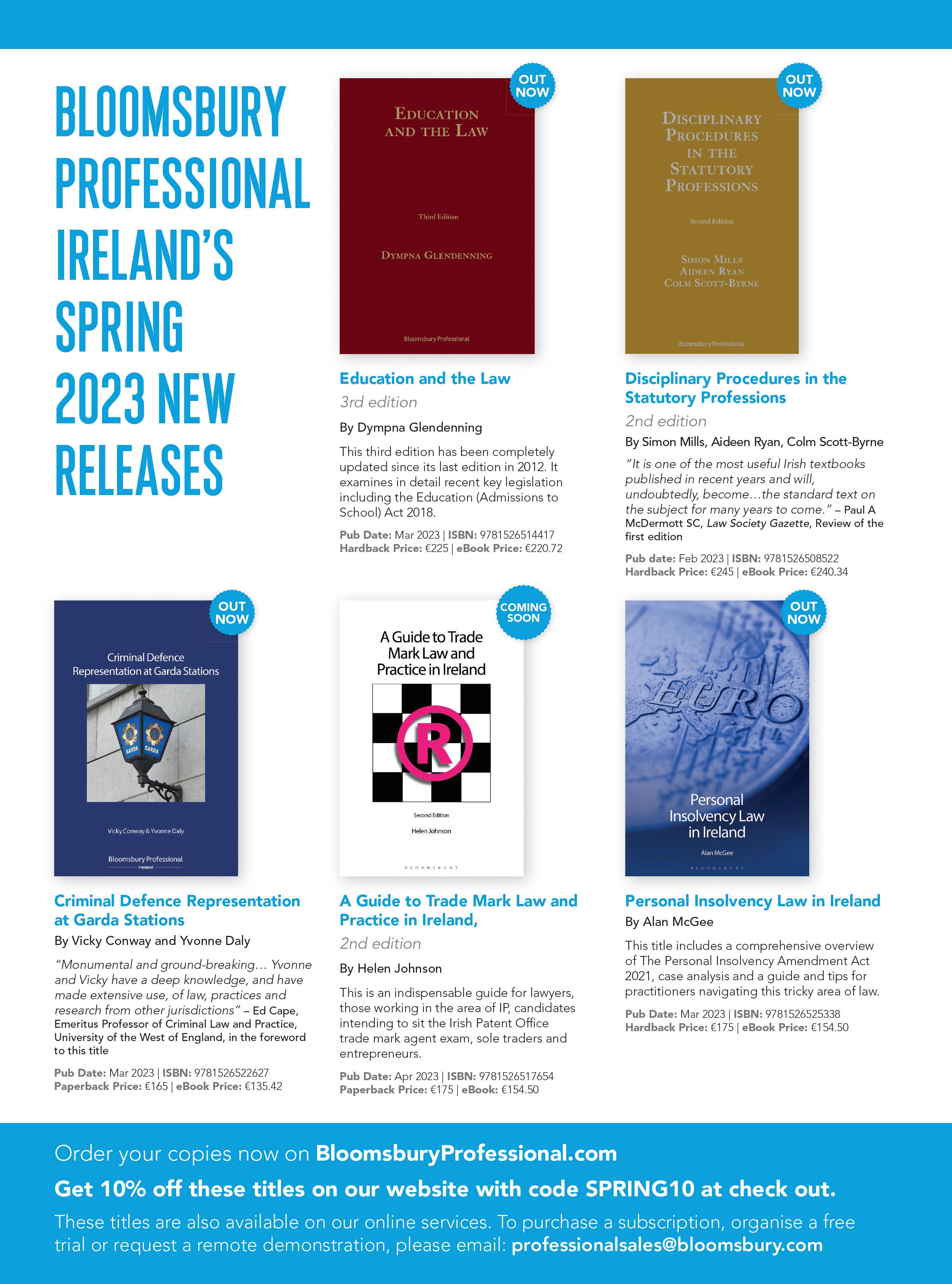
EDITORIAL
Editor
Helen Murray BL
Tom Flynn SC
Clíona Kimber SC
Paul McGarry SC
Cathleen Noctor SC
Sean O hUallacháin SC
Peggy O’Rourke SC
Alex White SC
Patricia Brazil BL
Lydia Bunni BL
Dearbhla M. Cunnigham BL
Simon Donagh BL
Elizabeth Donovan BL
Michael Kinsley BL
Cian McGoldrick BL
Lewis Mooney BL
James Nerney BL
Una Nesdale BL
Emer Ní Chúgáin BL
Tim O’Connor BL
Michael O’Doherty BL
Alison Walker BL
Ciara Murphy, CEO
Vanessa Curley, Law Library
Aedamair Gallagher, Policy & Public Affairs Manager
Paul O'Grady, Publisher
Ann-Marie Hardiman, Think Media PUBLISHERS
Published on behalf of The Bar of Ireland by Think Media Ltd
Editorial: Ann-Marie Hardiman
Paul O’Grady
Colm Quinn
Rebecca Pollard
Design: Rebecca Bohan
Tony Byrne
Meliosa Fitzgibbon
Advertising: Paul O’Grady
Calum Petit
Paul O’Grady
The Bar Review
Think Media Ltd The Malthouse, 537 NCR, Dublin DO1 R5X8
Tel: +353 (0)1 856 1166 Email: paul@thinkmedia.ie
Views expressed by contributors or correspondents are not necessarily those of The Bar of Ireland or the publisher and neither The Bar of Ireland nor the publisher accept any responsibility for them.
35 THE BAR REVIEW / Volume 28 / Number 2 / April 2023 36 Message from the Chair 37 Editor’s note 38 News Equitable Briefing Plan International Women’s Day 43 News feature CPD at the Bar The Bar Review The Bar of Ireland Distillery Building 145-151 Church Street Dublin DO7 WDX8 Direct: +353 (0)1 817 5025 Fax: +353 (0)1 817 5150 Email: aedamair.gallagher@lawlibrary.ie Web: www.lawlibrary.ie
BOARD
matters and news
to
Commercial
items relating
The Bar Review should be addressed to:
www.thinkmedia.ie www.lawlibrary.ie
CONTENTS APRIL 2023 45 News feature Fee recovery and collection trends 49 Interview A sense of balance 52 Law in practice Challenging water pollution ix Legal update 57 Law in practice Change of plan 62 Law in practice Statute barred 68 Closing argument Ending the eviction ban
Web
ACHIEVING EQUITY
All members can play a role in promoting the Bar’s Equitable Briefing Policy.
The theme of International Women’s Day 2023 (IWD) on March 8 was ‘Embrace Equity’, and the aim of the #EmbraceEquity campaign was to talk about why equal opportunities aren’t enough, and why equitable action is required to achieve equality of opportunity for all. The goal of equity is to change systemic and structural barriers that get in the way of people’s ability to thrive, and equity can be defined as giving everyone what they need to be successful. Importantly, this is not necessarily the same as treating people equally, since equal treatment presupposes a common starting point and if people start from different places, equal treatment may not be sufficient to ensure success.
What better way, thus, for The Bar of Ireland to mark IWD 2023 than to launch its Equitable Briefing Policy (EBP) on March 2. The EBP is a vital tenet of The Bar of Ireland’s Equality Action Plan, the aims of which are to enhance access to the profession and
Sara Phelan SC Senior Counsel, Barrister – Member of the Inner Bar Chair of the Council of The Bar of Ireland

to promote a diverse membership, while the aim of the EBP itself is to raise awareness of unconscious bias in briefing decisions. The EBP seeks to encourage those who brief the Bar to make a conscious effort to look beyond their usual pool of counsel and to assist in more equitable distribution of briefing in all areas of practice. It is a practical initiative that seeks to raise all boats, across the profession, with a view to improving the equality of opportunity for all genders, but specifically to support a pipeline of female counsel, so that representation at the more senior levels is improved.
We all have a role to play
The EBP is aimed at briefing entities, be they solicitors, in-house counsel or State agencies, and it is also aimed at barristers, in terms of recommending colleagues for new work or for handovers. Firstly, looking to briefing entities, the EBP simply asks that
all reasonable endeavours are made, when briefing counsel with the required seniority, expertise, and experience in the relevant practice area, that the distribution of briefs by gender be considered. Where there are equally capable female and male counsel available, arbitrary and prejudicial factors should not exclude the engagement of female counsel, particularly in areas in which men are more traditionally briefed. Likewise, in areas in which women are more traditionally briefed, arbitrary and prejudicial factors should not exclude the engagement of male counsel.
Diverse briefing practices mean that a diversity of life experience and perspective is brought to resolving client disputes and this can only be for the betterment of society as a whole. Indeed, when engaging with the briefing entities prior to the launch, it was clear that many of their clients were demanding greater diversity on briefing panels.
MESSAGE FROM THE CHAIR 36 THE BAR REVIEW / Volume 28 / Number 2 / April 2023
Update your profile
However, briefing entities cannot achieve equitable briefing on their own and the Bar has a significant role to play in promoting its members. This promotion is multi-faceted and from the perspective of individual barristers, we each should consider making our website profile as user-friendly as possible, so that it is easy for briefing entities to search and find counsel with, for example, particular areas of specialism or in particular geographic locations. Time and again we have been told by the briefing entities that the information on the Bar’s website requires significant input if it is to achieve its goal of providing the information they need to help them identify a more diverse range of talent. It falls to each of us to ensure that our profiles are up to date and sufficiently detailed to assist briefing entities, and an accompanying professional photograph will never go astray! Individually we can also consider contributing to written articles, be they for The Bar Review or other publications, and these articles can then be promoted on LinkedIn or on Viewpoints, the Bar’s public blog.
Collegiality and networking
At another level, the 17 Specialist Bar Associations (SBAs) can assist in promoting members with interests in a diverse range of practice areas. This promotion can easily range beyond Bar-only CPD seminars to arranging networking events with, and providing seminars to, briefing entities.
I mentioned above that the EBP is also aimed at barristers, in terms of recommending colleagues for new work or for handovers. Each of us can support the initiative, become an EBP signatory and commit to making all reasonable endeavours to ensure that the recommendations (of counsel) we make to clients and briefing entities include comparable female to male counsel, once skill, experience and seniority have been satisfied. We should also, in ‘handing over’ work to a colleague, aim to be gender equitable. The launch of the EBP is the beginning, not the end, and I look forward to promoting the policy with the assistance of all members.

Further details of the EBP are available at https://www.lawlibrary.ie/equitable-briefing/.
PLANNING AND POLLUTION
New planning legislation, actions on water pollution, and the eviction ban are all featured in this edition.
Helen Murray BL Editor The Bar Review
The April edition of The Bar Review offers a word of warning to the hale and hearty among us; anyone considering a dip in one of Ireland’s waters should read the examination by Lorna Madden BL of the environmental impact of water pollution and the legal challenges available. Her article provides a comprehensive analysis of the legislation governing recourse to the courts and highlights the areas that are in need of reform.
The President of the High Court, Mr Justice Barniville, discusses the most memorable cases in his career at the Bar, the age of retirement for judges, and his views on a range of actions that could, if implemented, increase access to justice.
Tom Flynn SC looks at the recently published draft Planning and Development Bill 2022, which proposes significant change in relation to the general public’s ability to judicially review planning decisions. These proposals, if enacted, could have farreaching impact.
Michael Nutley BL is the winner of the Young Bar Article Competition, and his essay on the survival of legal actions against the estate of a deceased person is a comprehensive guide to the law on this particular subject.
Finally, in our closing argument, Michael Kinsley BL weighs up the implications of the Government’s recent decision to lift the eviction ban for landlords and tenants.
EDITOR’S NOTE 37 THE BAR REVIEW / Volume 28 / Number 2 / April 2023
Specialist Bar Association news
Sports Law Bar Association and Tort & Insurance Bar Association
On March 3, the Sports Law Bar Association and the Tort & Insurance Bar Association held a joint event to address the recent Law Reform Commission consultation paper on unincorporated bodies. Participants spoke to how the proposed changes could affect the structure of sports clubs and their liability in tort. The event was attended by over 100 people and attracted interest from lawyers, journalists, national governing bodies of sport, local sports clubs and representatives of the law reform commission. In light of the May 15 deadline for making submissions to the Law Reform Commission, both have made a recording of this event available as a public resource on their websites – www.slba.ie and www.tiba.ie.
EU Bar Association
The EU Bar Association (EUBA), Ireland for Law and The Bar of Ireland hosted an in-person seminar in the Embassy of Ireland, London, on March 9. The Attorney General of Ireland, Rossa Fanning SC, delivered a keynote speech to barristers, London-based Irish lawyers, judges and in-house counsel, and spoke on the challenges facing both legal systems post Brexit due to the shared common law tradition. The seminar was expertly moderated by Caoilfhionn Gallagher KC and opening addresses were given by: the Ambassador, Martin Fraser; Brian Kennedy SC, Chair, EUBA; Paul McGarry SC, former Chair of The Bar of Ireland and member of the Implementation Group of Ireland For Law; and, David Hardstaff, Co-Chair, London Irish Lawyers Association. www.euba.ie.
Immigration, Asylum and Citizenship Bar Association
On February 21, the Immigration, Asylum and Citizenship Bar Association (IACBA), in conjunction with the Young Bar Association, hosted its annual seminar on practice and procedure before the International Protection Appeals Tribunal (IPAT). This annual event is particularly aimed at junior colleagues, who often get their first opportunities of advocacy appearing before the Tribunal. The expert line-up of speakers included Shauna Gillan, Deputy Chairperson of IPAT, who spoke on the perspective of the applicant’s counsel, the presenting officer and the tribunal, as well as Matthew Holmes BL, Noeleen Healy BL and William Quill BL.
www.iacba.ie
Probate Bar Association
The Probate Bar Association (PBA) has continued to host its programme of breakfast briefings in February and March with a talk by Aoife Beirne BL on ‘Cryptoassets in Probate’ and a talk by Christopher Lehane BL on ‘Insolvent Estates’. Along with many other colleagues, the PBA committee was delighted to attend and support the launch of the Equitable Briefing Policy, which took place on March 2. Since introducing affiliate membership for solicitors and other qualified persons at the end of last year, the ranks of the PBA membership continue to grow. Looking forward, the PBA will be hosting a joint online seminar with the Law Society on June 8, the details of which will appear on the PBA website in due course. www.probatebar.ie

Planning, Environment and Local Government Bar Association
On February 7, the Planning, Environment and Local Government Bar Association (PELGBA) and the EU Bar Association (EUBA) held a joint event. Speakers Ellen O’Callaghan BL and Hannah Godfrey BL spoke on ‘Pending Preliminary References’ and ‘The Supreme Court judgment in Heather Hill Management Company CLG v An Bord Pleanála ’, respectively. In light of the draft Planning and Development (Amendment) Bill 2022, published on January 26, 2023, the PELGBA hosted a dedicated event on March 16 where five speakers, accompanied by Mr Justice David Holland as chair, analysed the proposed changes introduced by the Bill.
www.pelgba.ie
NEWS
38 THE BAR REVIEW / Volume 28 / Number 2 / April 2023
Pictured at the recent Sports Law Bar Association and Tort & Insurance Bar Association event were (from left): Aoife Farrelly BL; Dermot Flanagan SC; Tim O’Connor BL; Rossa Fanning SC, Attorney General of Ireland; and, Maura McNally SC.
Professional, Regulatory and Disciplinary Bar Association

The Professional, Regulatory and Disciplinary Bar Association (PRDBA) hosted a joint breakfast briefing with Fieldfisher on February 17. Partners Sinéad Taafe and Zoe Richardson were joined on the panel by Ronan Kennedy SC and Peggy O’Rourke SC to discuss recent case law and professional regulatory law. The PRDBA’s next event will be a collaboration with Hayes solicitors that will take place in May. www.prdba.ie
Pictured at the recent Professional, Regulatory and Disciplinary Bar Association event were (from left): Zoe Richardson, Fieldfisher; Sinéad Taaffe, Fieldfisher; Ronan
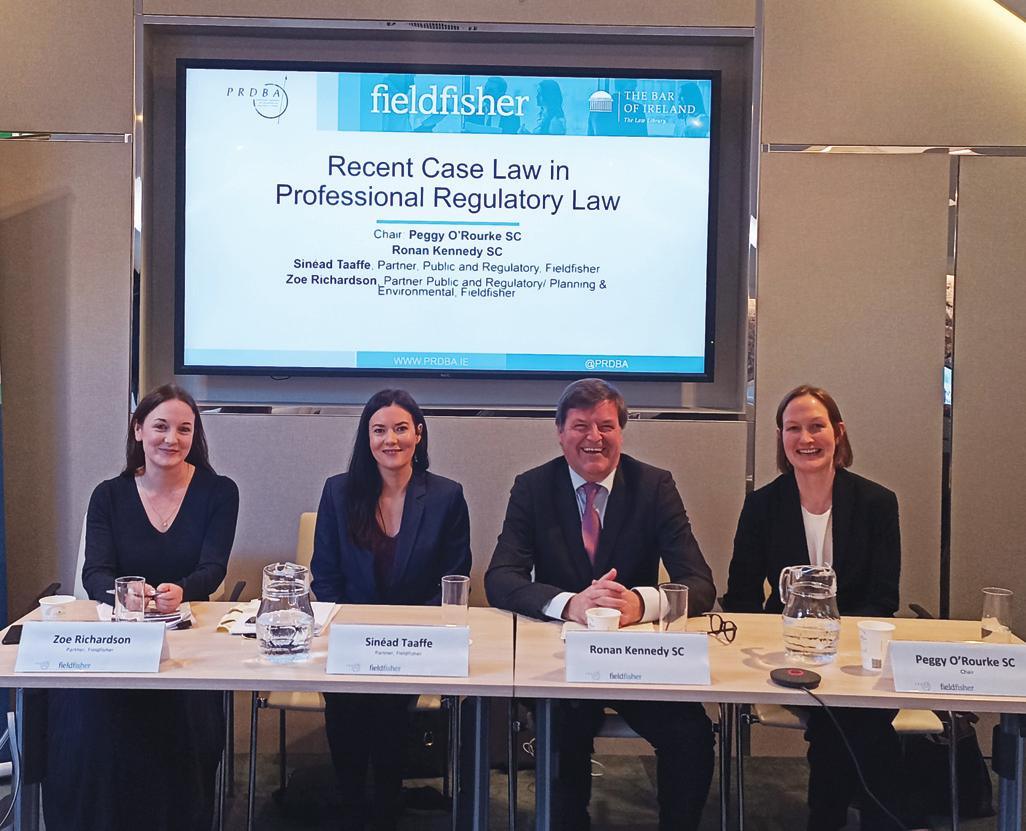
NEWS
39 THE BAR REVIEW / Volume 28 / Number 2 / April 2023
Kennedy SC; and, Peggy O’Rourke SC.
Climate Bar Association (Comhshaol)
In response to the draft Planning and Amendment Bill 2022, the Climate Bar Association made a submission to the Joint Committee on Housing, Local Government and Heritage, in which the Association addressed concerns over changes to the judicial review procedure in the context of Ireland’s obligations under the Aarhus Convention. The intention of this Convention is to remove barriers and broaden access to justice on environmental issues to the public. www.climatebar.ie
Construction Bar Association
The Construction Bar Association (CBA) continued its signature ‘Tech Talk’ series in February and March. Gerard Meehan SC spoke on ‘smash and grab’ adjudications, while Deirdre Ní Fhloinn BL compared the Irish and UK legislative responses to defective building. The Association is busy with preparations for its Annual Conference, which will take place on May 5. www.cbaireland.ie

Cumann Barra na Gaeilge
Bhailigh Cumann Barra na Gaeilge le chéile don Dinnéar Gaeilge in Óstaí an Rí ar an 15ú Feabhra. Ar an 11ú Márta thaisteal na baill go Ráth Chairn chun Ceardlann a thabhairt ar thopaicí suimiúla agus éagsúla. I measc na dtéamaí a pléadh ná ‘Riail anCab Rankle linn réabhlóid na Fraince’, ‘An Dlí i dTaobh na mBeach sa Mheánaois’, an síneadh fada, chomhchonaí agus An Bille um Pleanáil agus Forbairt 2022. Anois, tá an coiste ag tnúth go mór leis an gcomhdháil chun 50 Bliain de Dhlí na hEorpa a cheiliúradh a bheidh ar siúl ag tús mhí an Mheithimh i gColáiste na Gael, Leuven, An Bheilg. www.cumannbarra.ie

40 THE BAR REVIEW / Volume 28 / Number 2 / April 2023 NEWS
International Women’s Day 2023
The Bar of Ireland held its eighth International Women’s Day Dinner at the King’s Inns on March 9, and welcomed keynote speaker Sinéad McSweeney, Former VP, Global Public Policy & Philanthropy at Twitter.

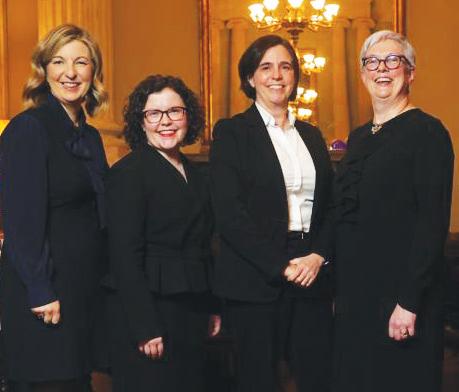
Far left (from left): Aoife Farrelly BL, Chair, Equality & Resilience Committee; Aoife McNickle BL; Moira Flahive SC; and, Sara Phelan SC, Chair, Council of The Bar of Ireland.
Left: Sinéad McSweeney addressing The Bar of Ireland’s annual International Women's Day celebration at the Honorable Society of King’s Inns.
Financial planning with a DMA/DMR
Court-appointed decision-making assistants (DMAs) and decision-making representatives (DMRs) face a challenging role to make sensible financial decisions and engage with financial institutions on behalf of an incapacitated person.

The financial advisor must determine what advice is suitable for the client through the DMA/DMR, which also presents difficulties. What of the judge tasked with approving the DMA/DMR and the barrister advising them? How do you know if a DMA/DMR is up to the task? Clinch Wealth Management (Clinch) suggests the following approach.
Firstly comes planning, which involves conducting a review: compile financial background information and establish a profile of the DMA/DMR and the incapacitated person; assess and plan the long-term cash flow; ascertain financial resources and liabilities; determine the attitude to investing and risk; and, ascertain if the incapacitated person has a will or a family solicitor.
Then comes the implementation of the plan, where the requirements are matched to financial solutions. Ask yourself what investment return is required. Does the required return match the investment preferences
of the DMA/DMR and the person? Will the finances arranged produce the income required? What liquidity is required to produce additional capital? Is it necessary to draw down pensions, sell properties, businesses, or any other assets so that an income can be produced?
Clinch recommends the following general principles: hire a financial advisor that you trust; make a comprehensive financial plan and review it annually; be conservative in your assumptions about investment returns and longevity; and, avoid unregulated financial products.
41 NEWS THE BAR REVIEW / Volume 28 / Number 2 / April 2023
Commemorated on canvas
Equitable briefing policy launched
The Minister of State at the Department of Justice and Equality with responsibility for Law Reform, James Browne TD, officially launched The Bar of Ireland’s Equitable Briefing Policy on March 2.
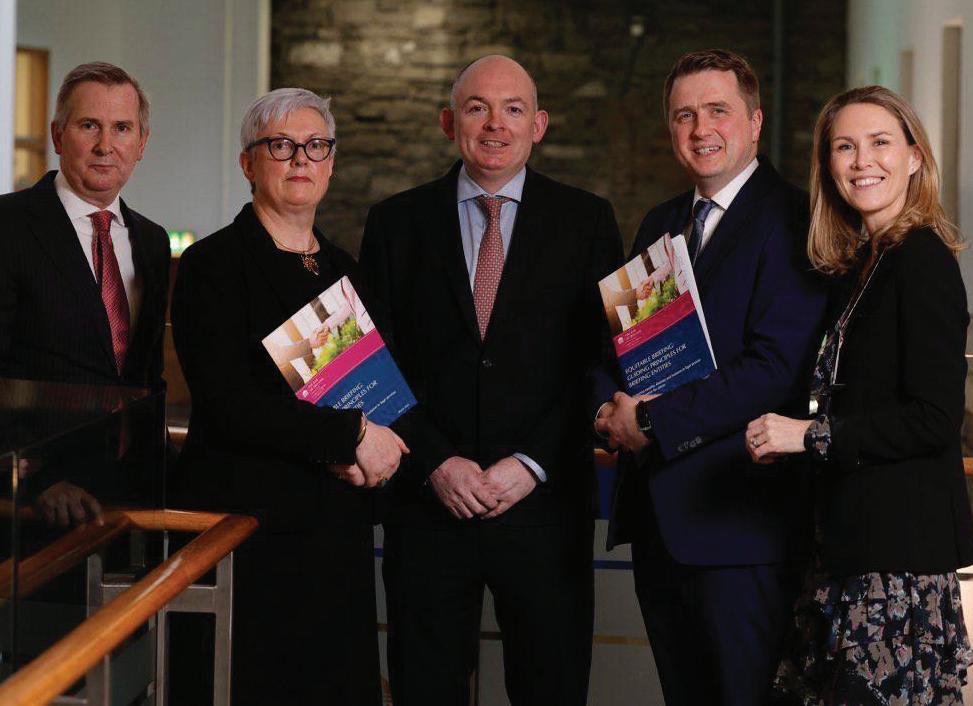
The Policy seeks to ensure that wide areas of legal practice benefit from the contribution of all genders. In addition, it seeks to address the underrepresentation of female counsel at senior levels and before the senior courts.
Minister of State Browne said: “I welcome the Bar Council of Ireland’s leadership in introducing this Equitable Briefing Policy, which seeks to make equality of opportunity in the legal profession a reality rather than an aspiration. One of my Department’s key priorities is improving access to justice. The Bar’s Policy speaks to the other side of ensuring access to justice, which means giving all people access to legal practice as a profession. It is important that this profession is representative of the people it serves”.
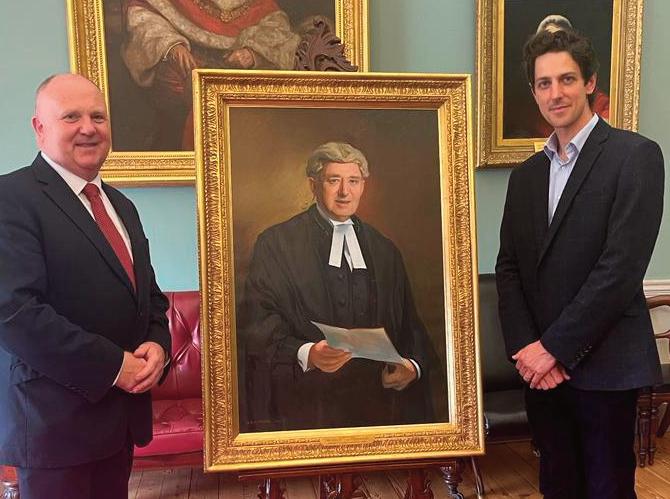
Speaking in advance of the launch, Sara Phelan SC, Chair of the Council of The Bar of Ireland, said: "We believe that the benefit of this Policy will be delivered right along the value chain of legal services – from practitioners to clients, and to members of the public who procure our services. The adage that while talent is variable, the equality of opportunity to develop talent should be made available to all, applies here”.
The Policy invites briefing entities to use their best endeavours to consider gender when presenting or constructing panels of counsel, once satisfied that the requisite standard of expertise, skill and seniority has been met.

42 THE BAR REVIEW / Volume 28 / Number 2 / April 2023 NEWS
Pictured at the launch of The Bar of Ireland’s Equitable Briefing Policy were: Mr Justice David Barniville; Sara Phelan SC, Chair, Council of The Bar of Ireland; Rossa Fanning SC, Attorney General; James Browne TD, Minister of State at the Department of Justice and Equality with responsibility for Law Reform; and, Caoimhe Clarkin, Partner and Head of Litigation and Regulatory, DLA Piper.
Pictured at the unveiling of a portrait of the late Mr Justice Adrian Hardiman, which took place at the King’s Inns in January, were (from left): Hugh Mohan SC; and, artist Will Nathans.
CPD AT THE BAR
The old idiom that ‘every day is a school day’ could have been coined with a career at the Bar in mind. Indeed, at the risk of an overload of idioms and adages, in a barrister’s practice ‘no two days are the same’ and, accordingly, we are always learning. However, in parallel with that practical learning there has, over the past decade or more, been an increased emphasis on structured continuing professional development (CPD) and an associated increase in what The Bar of Ireland provides for members in that regard.
In October 2021, a fully revised CPD scheme was introduced, requiring members to attain a total of 20 CPD points each year across four domains. One of those points must be in respect of ethics, with at least 12 being attributable to a structured/formal CPD activity (exactly what you probably think it is, namely seminars, lectures, conferences and so on), and the balance being attributable to unstructured CPD activity (reading, podcasts, writing articles and the like).
Following the revised scheme’s launch, the Education & Training Committee (ETC) has focused on enhancing and expanding the range of offerings available to members. ‘My CPD’, The Bar of Ireland’s bespoke learning management system, was

launched in July 2021, and has been instrumental in supporting members in meeting their revised obligations. Not only are there some 100 live seminars held every year (both in person, online and hybrid), the majority free to members, members can also avail themselves of over 300 hours of CPD seminar content via My CPD across all four domains. Indeed, since the launch of the revised scheme, member engagement has been excellent, with a
120% increase in the CPD completed via The Bar of Ireland in the first year.
However, the purpose of this article is not, despite what the preceding paragraphs might suggest, to engage in a bout of self-congratulation. Rather, it is to emphasise that there is still a lot to be achieved, not least by reason of the fact that the Legal Services Regulatory Authority (LSRA) will become responsible for CPD provider accreditation and with that responsibility comes the power of audit. The Professional Practices Committee (PPC) works with the ETC to oversee compliance and certification by members, and the two committees have been working closely together with a view to preparing for that audit process. That is why members receive a significant number of communications in relation to education, training and compliance.

To assist members in understanding what to expect over the rest of this year and beyond, and in anticipation of the external audit, we set out below a CPD ‘road map’. We encourage members to engage with and embrace the education and training offering. It is also important that members appreciate the reasons for the emphasis on compliance. We hope that this article helps in that regard.

43 THE BAR REVIEW / Volume 28 / Number 2 / April 2023
The Bar of Ireland’s new CPD scheme has met with considerable success, but there is more to be done, as audit from the LSRA approaches.
Darren Lehane SC Chair, Professional Practices Committee
NEWS FEATURE
Brendan Kirwan SC Chair, Education and Training Committee
A quality charter
Improved learning needs identification processes
Refreshing older content
New practical courses
CPD audit –Michaelmas 2024
A quality charter
A quality charter is being developed that will highlight The Bar of Ireland’s commitments to members in the provision of high-quality CPD. This will outline what you can expect as a member from our CPD offering.
Improved learning needs identification processes
An annual process for gathering information from members regarding practice needs has been commenced. This process involves a range of different methods, such as interviews, focus groups, and event feedback forms to ensure that the CPD programme is aligned to the current needs of the membership. Member views and feedback on the programme are essential for its continued improvement. We would encourage you to take the time to participate in these initiatives.
Refreshing older content
Online CPD and recorded content is playing an increasing role in assisting members to meet their CPD needs. The following steps will be taken to sustain the quality and currency of content within the online CPD catalogue:
n creating an archive for retired online content: the retired content will be distinguished from ‘active’ CPD content on My CPD - retired content will no longer afford formal CPD points but will still be available on the system as, although no longer current, it may present a valuable snapshot of the law in a particular area at a particular time; n reviewing all content on a two-year cycle; and., n adding a facility on the learning management system where members can flag content they feel is obsolete or no longer up to date.
New practical courses
Recognising the need for greater opportunities to develop practical skills, a range of new short courses has been rolled out and more are in development. The first of these was the advanced negotiation course, which, following a successful pilot in November 2022, is now available to members. Other offerings that will be piloted in 2023 include: advanced drafting;
practice management essentials; and, a programme on professional networking and promoting your practice online.
CPD audit – Michaelmas 2024
Currently, all members annually self-certify that their “CPD compliance is subject to audit, including any vouching documentation, at the discretion of the Professional Practices Committee (PPC)” and “That insofar as CPD attendance has not been recorded under my Law Library email address, I have retained the documents necessary to vouch for this as required by the Code of Conduct”. Audit of CPD compliance is commonplace across professions and is necessary for several reasons:
1. Members’ and The Bar of Ireland’s statutory obligation under Section 13 of the Legal Services Regulation Act 2015 – “Functions of [LSRA] Authority –the availability and quality of the education and training (including ongoing training)”.
2. CPD audit provides objective data regarding the profession’s commitment to CPD and career-long professional learning.
3. CPD audit provides an ongoing opportunity to support those who are challenged to meet their CPD obligations.
In December 2022, The Council of The Bar of Ireland approved the introduction of an annual randomised audit of member CPD, commencing with an audit of the 2023/24 CPD year:
n a randomised audit of between 100 and 330 members will be conducted on an annual basis;
n members called for audit will be required to submit any missing information regarding their compliance via the online CPD record tool within a timeframe set out by the PPC; and,
n members who fail to demonstrate compliance with the requirements when called for audit will automatically be included in the next audit.
During Hilary 2023, further details regarding the audit process will be notified to all members by the PPC after consultation with the ETC.
44 THE BAR REVIEW / Volume 28 / Number 2 / April 2023
NEWS FEATURE
FEE RECOVERY
AND COLLECTION TRENDS
The Practice Support & Fee Recovery service aims to assist members with the recovery of outstanding fees, and to provide greater guidance and support in matters of financial and practice management.

















The Practice Support and Fee Recovery service has now been in place for over two years and during this time we have seen a continued growth in the number of members engaging the fee recovery service. In addition, there has been the development of a significant number of new practice management supports, which are available to members via the online 'Practice Support and Fee Recovery' hub.
Fee recovery process











Members may avail of the fee recovery service in respect of up to three overdue fee notes at a time, provided they have made reasonable attempts to secure payment, and the fee notes are overdue for a period of six months or greater. Once a member completes registration for the service, and an
 Lynn Blake Practice Support Manager
Lynn Blake Practice Support Manager

account has been set up, the recovery team will begin the structured collection process. Figure 1 provides a high-level overview of the steps followed in the collection process.
The fee recovery team keep each member updated on all aspects of their case as it progresses through the various stages through a dedicated online account.
45 NEWS FEATURE THE BAR REVIEW / Volume 28 / Number 2 / April 2023
Account set up Fee note registered Collection process begins Collection letter 1 issued to solicitor 21 days to respond If no response to letter 1 Collection letter 2 issued to solicitor 7 days to respond If still no response or acceptable solution. Collection letter 3 FINAL NOTICE issued to solicitor – 5 days to respond Decision required: Contact client to confirm payment. Refer to LSRA complaints process Complaint form drafted and sent to LSRA complaints team for investigation
reviews complaint and assesses if it is admissible or not
admissible it will be
to LSRA
LSRA
If
referred
complaints committee to conduct a review Committee determines if a direction or sanction is warranted
FIGURE 1: Fee recovery service – collection process overview.
Trends in fee recovery
Who is using the service?
At present we have over 175 members of the Law Library actively using the service, which equates to 8.1% of the total membership. The majority of users are full juniors (years 12 and upwards) making up 50% of users, 29% are juniors in years 4 to 11, and the remaining 21% are senior counsel.
Current fee notes outstanding
Currently there are over 200 fee notes, totalling just over ¤2.2m, registered with the service, in which professional fees remain outstanding. These unpaid fee notes can be categorised under eight primary reasons for non-payment as shown in Table 1. It is apparent from an analysis of this information that the first three categories – solicitor not cooperating, client issue or fee dispute – account for over 70% of cases of non-payment of professional fees to counsel.
Fees recovered to date
To date the service has recovered payment for 217 fee notes with a combined value of ¤1.06m. This represents a recovery rate of over 51% in terms of the number of fee notes referred, and 33% in value terms, which is significant given that the fee notes referred to the service are those that are most problematic. Of the fee notes recovered, the median average number of months to obtain payment once registered with the service is 12 months, with over 40% of fee notes being recovered within the first six months of being referred.
Fees registered by court and by area of law
The analysis at Table 2 shows a breakdown of the current fee notes outstanding and the fee notes recovered by court. This analysis shows that the majority of fee notes registered, over 50%, relate to work at the High Court level.
The analysis at Table 3 shows a breakdown of the current fee notes outstanding and the fee notes recovered by area of law, in terms of civil, criminal, and family.
1. Solicitor not co-operating No engagement from solicitor with service after repeated attempts
2. Client issue Client is not responding to correspondence or does not have funds to settle the account
3. Fee dispute
is disputing the amount charged
4. Matter ongoing The case in question has not concluded, and costs have not been fully calculated
5. Administration delay Delays can occur either with the solicitor’s office investigating the claim, or a State agency processing the claim
6. Probate delay Cost cannot be finalised until probate has been completed
The vast majority of fee notes referred to the service are in the area of civil litigation, which at present
account for 87% of the current fee notes outstanding with the service.
46 THE BAR REVIEW / Volume 28 / Number 2 / April 2023 Reason Explanation % of cases
30.65
22.11
17.59
Solicitor/client
12.06
12.06
3.52
Proceedings
The client refuses to
fees,
client
the solicitor
proceedings 1.01
Solicitor
This
a
solicitor
the case 1.01
7.
issued
discharge
against
resulting in
issuing
8.
firm dissolved
occurs when a solicitor’s firm has shut /file transfer down and
new
takes over
Table 1: Reasons for non-payment of barristers’ fees.
Report on fees by court Fee notes outstanding Fee notes paid Court % % Supreme Court 2 1 Court of Appeal 1 2 High Court 54 50 Circuit Court 21 22 District Court 8 8 Family Courts 4 2 Coroner’s Court 2 0 Workplace Relations Commission 2 2 International Appeals Tribunal 1 2 Advisory work 6 4 Other 2 6 NEWS FEATURE Report on fees by area of law Fee notes outstanding Fee notes paid Area of law % % Civil litigation 87 83 Criminal litigation 7 10 Family law 7 7
Table 2: Fee notes outstanding and paid by court.
Table 3: Fee notes outstanding and paid by area of law.
LSRA complaints
The final escalation point in the fee recovery process for unrecoverable fee notes is to make a complaint to the Legal Services Regulatory Authority (LSRA). To date, the Service has filed 45 complaints on behalf of members to the LSRA arising from non-payment of fees by solicitors.
The analysis at Table 4 shows the status of each of these complaints.
Summary
Some 9% of complaints made by the recovery service on behalf of members to the LSRA have been settled after a complaint has been deemed
admissible but before reaching the Complaints Committee. A further 22% were settled before the LSRA preliminary review stage had been completed.
So far, only two complaints lodged by the Service have reached the Complaints Committee stage: one complaint was upheld, and one was not.
Active complaints
Complaint filed The complaint has been lodged with the
LSRA and is awaiting processing and allocation of a case number and case officer by the LSRA
file and assessing
stage if the complaint is admissible or not Complaint deemed Case officer has determined the complaint
admissible and is admissible. Complaint has been referred referred to the to the complaints Committee for review. Complaints Awaiting date to be heard by Complaints Committee for review Committee
Closed complaints –upheld or settled
Fee note paid in full Complaint closed as fee notes paid in full or
or settlement agreed settled during preliminary review stage prior during preliminary to admissibility determination review stage Complaint declared Complaint determined admissible and was referred to
admissible but paid in the Complaints Committee. The fee note was paid in full prior full prior to Complaints to the Complaints Committee hearing on the basis Committee hearing the complaint would be closed Complaint upheld but Complaint determined admissible and brought before the
no sanction imposed Complaints Committee. The Complaints Committee upheld the complaint but did not impose a sanction Closed complaints –not upheld or withdrawn
Deemed inadmissible Complaint deemed inadmissible as case officer found that no
specific evidence warranted misconduct and the complaint was closed by the case officer
Complaint deemed admissible Complaint was deemed admissible by case officer and referred 1 2 but not upheld to the Complaints Committee. Following Complaints Committee review they advised that the complaint was not upheld Complaint withdrawn Complaint withdrawn by member prior to admissibility 2 4 by member determination as they deemed it uncollectable
47 THE BAR REVIEW / Volume 28 / Number 2 / April 2023 NEWS FEATURE
Status
No. of complaints % of total complaints
Table 4: Complaints lodged with LSRA, on behalf of members, for non payment of fees.
Explanation
6 13
Preliminary
officers
7 16
12 27
review Case
reviewing
10 22
4 9
1 2
2 4
Fee recovery case example
The following is an example of a fee recovery process that progressed to an LSRA complaint and resulted in full settlement of the fee note for the member. This is a fictional example, but based on actual collection processes that the fee recovery service has undertaken.
Summary of case
n Area of law: Civil
n Court: Circuit Court
n Fee note date: April 2021
n Fee note value range: <¤4,000
n Date registered with service: April 2022
Collection and complaint process
In April 2022 the member completed their registration with the Service and submitted the above fee note. The member advised that they had attempted to recover the fees from the instructing solicitor for over 12 months but with no success.
The recovery team logged the fee note on the fee recovery database and issued the first collection letter to the solicitor; no response was received. Over the course of the following month the fee recovery team issued a number of collection letters to the solicitor in line with the standard collection process. The solicitor did not respond to any of these letters. The team then, with agreement from the member, followed up with the client directly to ascertain if payment had been made to the solicitor. The client confirmed that they had settled their bill with the solicitor. It was then agreed with the member to submit a complaint to the LSRA regarding the instructing solicitor on grounds of misconduct. The complaint was submitted in June 2022. The LSRA assigned a case officer to the case, who commenced a preliminary review of the complaint.
There hasn’t been a sufficient number of complaints lodged by the recovery service that have reached the Complaints Committee review stage yet in order to provide any meaningful analysis on determinations. However, we will continue to monitor the outcomes from the LSRA and provide feedback for members in future articles.
Get in touch
We would encourage members to visit the 'Practice Support and Fee Recovery' hub on the
Under the Legal Services Regulation Act the LSRA is required to conduct a preliminary review to determine whether or not a complaint is admissible. In essence, this means that complaints staff gather evidence from both the complainant and the legal practitioner. As part of this process, the LSRA must notify the legal practitioner of the complaint in writing, provide the legal practitioner with a copy of the complaint, and request a written response with observations within 21 days. Complaints staff may also, at this preliminary review stage, request additional information in writing from either the complainant or the legal practitioner. Legal practitioners are encouraged to provide a full response to allegations made and to provide any relevant evidence that they may have at this stage. The LSRA has noted that it is often necessary to seek further information from the complainant and/or from the legal practitioner in order to ensure that the LSRA has sufficient material to arrive at a decision in relation to the admissibility of a complaint.
In this example, the case officer completed a preliminary review over the following two months and, based on the complaint information submitted, the information obtained from the member and the response from the solicitor, the case officer deemed the complaint admissible. The next stage in the LSRA complaints process is to refer the complaint to the Complaints Committee. The Complaints Committee considers and investigates complaints of alleged misconduct about legal practitioners that are referred to it by the Authority Executive. The Complaints Committee will determine if the complaint is to be upheld or not, and can issue a direction and/or sanction. In this case, once the case officer had determined the case admissible and informed the instructing solicitor of their decision, they agreed to settle the fee note in full prior to the complaint going to the Complaints Committee. The member received payment in full and the complaint was closed.
website and familiarise themselves with the range of best practice information and tips on offer, which include guidance in the area of billing and fee collection. For those who wish to avail of the Fee Recovery Service, please contact the team, as detailed below. A starter pack will be sent to you, together with the terms and conditions of the Service. There is no additional charge for this service as it is part of the full suite of services arising from your membership of the Law Library.
You can access the Practice Support and Fee Recovery Hub here
Lynn Blake, Practice Support Manager
Ext: 5053 Email: practicesupport@lawlibrary.ie
Grace Hughes, Fee Recovery Administrator
Ext: 5409 Email: feerecovery@lawlibrary.ie
48 THE BAR REVIEW / Volume 28 / Number 2 / April 2023 NEWS FEATURE
BAL ANCE A SENSE
President of the High Court Mr Justice David Barniville spoke to The Bar Review about his career, the need for more judges and resources, and improving access to justice.

 Ann-Marie Hardiman Managing Editor, Think Media
Ann-Marie Hardiman Managing Editor, Think Media

Mr Justice David Barniville’s immediate background is not a legal one. Originally from Shankill in Co. Dublin, his parents were both doctors, but the family might better be described as having a sporting life. Both parents were tennis internationals, competing at Wimbledon and, in his mother’s case, the US Open. His mother also played squash for Ireland, reaching the top ten in the world. When it came time to choose his own career, however, he opted for a law degree at UCD, and says he chose to progress to the King’s Inns largely because, unlike the Law Society, no entrance exam was required at the time. While there were solicitors in his mother’s family (her father Des Houlihan and brother Jim Houlihan of Birr, Co. Offaly), the only barrister was his uncle, the well-known senior counsel Liam Reidy, who he says was “brilliant” to him after he was called to the Bar in 1990: “Liam arranged for me to devil with Paul Gallagher. Paul took silk during my devilling year and arranged for me to finish the year with Denis McDonald, who is now a colleague of mine on the High Court. So I was very, very lucky in my first year devilling, and got great exposure to loads of different things”.
Two elements that Mr Justice Barniville cites often in describing his early career are luck, and the fact that he had the opportunity to work with outstanding barristers. The next piece of luck came when he applied for a lecturing role in King’s Inns in 1991. He was unsuccessful, but instead was offered the opportunity to join Mr Justice Hamilton’s team at the Beef Tribunal as research junior. He jumped at the chance, and says it was a fantastic experience: “They had all these incredible cases starting, challenging the Beef Tribunal. You got to see people like Dermot Gleeson, Seamus McKenna and Donal O'Donnell, all of these really top-class people, in action”. He says that he was very fortunate to have worked alongside many of the leading counsel over the years and mentions, in particular, Murray McGrath, Peter Shanley, Garrett Cooney and Paddy Connolly. It wasn’t all glamour though: “On the one hand, I was in some of those cases, and on the other, I was doing very routine cases in the District Court. One early case I remember from that time was a case about a defective Sony Walkman, which cost about £25 in those days. I was acting for the retailer of the Walkman, and the fellow who bought the Walkman wasn't at all happy with how it behaved, and it ended up in litigation before the District Court. I can't remember what the result was, but it cost more than the Walkman!”
49 THE BAR REVIEW / Volume 28 / Number 2 / April 2023 INTERVIEW
The most important area of work in our system is people who defend and prosecute cases. If you don't have good people doing that kind of work, you don't have a good system.
OF
Access to justice
Mr Justice Barniville cites three areas in particular where he feels that reform would increase access to justice. Reducing the waiting times so that cases and trials can come to court more quickly, and judgments can be delivered, will hopefully be aided by the new judges and planned reforms. He also feels that our system of civil legal aid needs considerable reform, and welcomes the review currently being carried out under former Chief Justice Clarke. The third is an issue he feels particularly strongly about: the restoration of fees for barristers carrying out criminal legal aid work. Despite strong representations from The Bar of Ireland, barristers carrying out this work continue to be paid at 2002 levels. Mr Justice
Advocating for the profession
Mr Justice Barniville is a former Chair of the Council of The Bar of Ireland, a former President of the Association of Judges in Ireland, and current Chair of the Judges’ Forum of the International Bar Association. He says he wasn’t initially a “committee person” at all: “Turlough O'Donnell, who was then Chair of the Bar Council, asked me would I agree to be co-opted onto the Council. I think that was the first committee I was ever on in my life”.
He quickly found that he enjoyed the work: “The Legal Services Regulation Bill was published around that time, and I got involved in that. You learn a lot about dealing with the non-legal world. I found it interesting and really enjoyed it. It's a good thing for people generally to do to get involved in the profession, if they have the time and the capacity, because you're doing it for your colleagues”.
He also sees the value of organisations that foster relations among barristers and judges in different jurisdictions: “Our judges are involved in quite a lot of different international bodies that are really useful on issues that are common to judges. On a personal level, it's very interesting to meet people from other countries and see what their job is like”.
He is very pleased to have been asked to get involved in assisting the Ireland for Law initiative to promote Ireland as a leading global centre for legal services and dispute resolution.

Barniville feels that this is a very serious issue for the profession, and for the administration of justice as a whole:
“I just don't understand how the work that they do can be so undervalued. The most important area of work in our system is people who defend and prosecute cases. If you don't have good people doing that kind of work, you don't have a good system. My understanding is that the Department of Justice is supportive of a restoration and an increase in fees, but it's not been supported elsewhere within the system and I don't see a rational argument against it. I think these people perform an extremely important role and they should be properly paid for it”.
Transition to the bench
Mr Justice Barniville was appointed to the High Court in 2017, to the Court of Appeal in 2021, and took up his current role in July 2022. He says he was ready for the move to the bench: “I wasn't seeing enough of my family. I also found practice got much more stressful. People's expectations were very high; if you were lucky enough to get good, well-paying cases, people expected something in return for that. You had to work hard and you had to pretty much spend your whole time working really”.
Perhaps unsurprisingly, he therefore found the transition a very positive one: “People had said it could be very lonely – I didn't find that at all. My colleagues were extremely good to me and welcoming. One thing that was different was you literally left the Bar one day and the next day you walked out onto the bench, and the first thing you noticed is we have obviously a totally different viewpoint of the court. That was the biggest shock and you're not really prepared for that. You’re also exhausted at the end of the day, where you're having to listen and concentrate the whole time. As a barrister, in some cases, you could switch off, and listen less actively, for a time, if you weren't covering that part of the case. But as the judge, you have to listen to everything and concentrate the whole time. If you hear a difficult case, you can see the counsel and the solicitors packing up their papers and going
out, and you realise: now I have all of this stuff here that I have to get on top of and eventually come back with an answer. So it's definitely very different in that respect, but I really enjoy it”.
Judicial and court reform
The members of the judiciary, and the legal professions in general, have long made the case that Ireland needs more judges. We have significantly fewer per capita than many of our neighbours, and this has undoubtedly led to delays in cases being heard, and thus impacted on the administration of justice. Like all his colleagues, Mr Justice Barniville welcomes the recent announcement, on foot of recommendations from the Judicial Planning Working Group, that additional judges will be appointed, including six for the High Court initially, and hopefully a further six in 2024. He points out, however, that all six have already been allocated: “Three are allocated to cover for existing judges who will be doing an entirely new area of work under the new assisted decision-making legislation, and one will go to the Central Criminal Court where there are delays in getting jury trials on”.
One judge will be assigned to the Commercial Planning and Environmental List, which will soon become the new Planning and Environmental Court, leaving just one new judge to go to all the other lists that require a judge. Mr Justice Barniville agrees that
50 THE BAR REVIEW / Volume 28 / Number 2 / April 2023 INTERVIEW
the next six appointments can’t come soon enough. The Working Group’s report also makes a number of recommendations regarding resourcing and efficiencies in the courts, and the Chief Justice has established an implementation group to this end. The Department of Justice also has its own implementation group, and Mr Justice Barniville points out that it’s not all about the judges and the Courts Service: “Every time you appoint an additional judge, there are a whole lot of other resources that are necessary. For example, in crime, if you appoint more judges, that puts pressure on the guards, on the Director of Public Prosecutions, on the defence, and on the legal aid system”. He feels that these are all challenges that can be overcome, however: “You can understand that if the Government decides it's going to invest in the appointment of additional judges, they want to see that they're going to make a difference. I'm convinced that we will be able to demonstrate that”. There are other changes too, which could help to improve efficiency. Remote hearings became almost the norm during the pandemic, and while his personal preference is for advocates to appear in person where possible, Mr Justice Barniville acknowledges that there is a clear place for remote and hybrid arrangements where they are necessary, or where they would speed up proceedings. It is particularly appropriate, he feels, in wardship cases, which he hears three days a week, where very often evidence has to be taken on a very urgent basis from doctors or other experts.
Flexible use of courtrooms is another suggestion: “You may have a judge sitting earlier in the morning and finishing by lunchtime, and then another judge in that same courtroom starting in the afternoon and sitting a bit late. Those are the sorts of things the implementation group will look at, and we have to be flexible. I'm very lucky that the High Court is a great court. I’ve got great colleagues on it. They’re all very open to all of these kind of things”. The retirement age of judges, currently 70, is something else that has come up for discussion over the years. Mr Justice Barniville is one of those
who would like to see it increase, even on an optional basis, but as the Working Group opted not to make any recommendation on this issue, this is unlikely.
A self-employed profession
Mr Justice Barniville is very much aware of the Bar’s recent efforts to increase accessibility to, and diversity within, the profession, and cites the Transition Year Programme, the Law & Women Mentoring Programme, and the Denham Fellowship, among others, as fantastic examples of what can be done. It’s a difficult issue though, especially for a self-employed profession: “What they're doing now is a hell of a lot better than what was done before. The professionalism of the Bar Council and its executive team is really second to none. Accessibility has always been a problem, but there's a limit to what a collective of self-employed people can do. They can only try and create the conditions that make it a bit easier. People might have expectations that the Bar should be doing all sorts of things, but the Bar isn't the employer of anybody”. He points out that there are other routes for those interested in a career at the Bar, and cites the judicial assistant programme in the courts: “We're very keen to promote the judicial assistant scheme because not everybody is aware of it, or sees it as a career option, but I think it's a great stepping stone. If you've got no connections at all, you will end up having a very close relationship with the judge that you're assigned to, and a great opportunity to access lawyers and registrars, and see how the system works”. What does he think is the Bar’s greatest strength?
“I think the biggest strength of the Law Library is that you have all of the people who are the top people in the profession, all operating out of one space. Being able to ask somebody ‘would you mind if I just asked you something really quickly?’ and from the busiest, the top people, they will always say ‘Of course, what is it?’ That doesn't happen anywhere else. In one sense this is probably the most egalitarian and meritocratic system, whereby you come in and compete against everybody else from
the start. There's no bar to you coming in other than the cost, which I don't, in any way, want to underestimate, as it is a serious cost, but you can at least get in”.
Work-life balance
Mr Justice Barniville says his work-life balance has improved immensely in recent years (although his role as President of the High Court has increased the workload again somewhat) and acknowledges the strain a career at the Bar can place on family life: “I certainly did struggle with getting that balance right, and I'd say a lot of people do. Some people do it very effectively; I wasn't very good at that. It was a massive improvement when I went to the High Court and I found it much easier to properly contribute to things at home than I did before. I know that people do have mental health issues and I would certainly have felt quite stressed at times and found it difficult to cope. I know there are now different measures in place to try and help people at the Bar with those issues. There are judges who could do with that sort of support as well, judges who deal with really awful criminal cases, historical sex cases and things like that. I don't know how they do those day in, day out. It's very important, I think, in all of those areas, for there to be supports”.
A different court
Outside of the courts, Mr Justice Barniville follows in the family footsteps and likes both watching and playing sports. Once a keen tennis player, he has recently moved to playing padel (or ‘paddle’) tennis, a cross between tennis and squash that has been imported from Spain and Portugal. He runs, enjoys reading, watching all sports on television, and a decent glass of wine, and likes to travel with his wife Susan and three teenage children, Harry (18), Jack (16) and Cara (13). These days he can be spotted as a spectator at, and chauffeur for, his children’s sporting endeavours as they too follow in the family footsteps.
51 INTERVIEW THE BAR REVIEW / Volume 28 / Number 2 / April 2023
CHALLENGING WATER POLLUTION
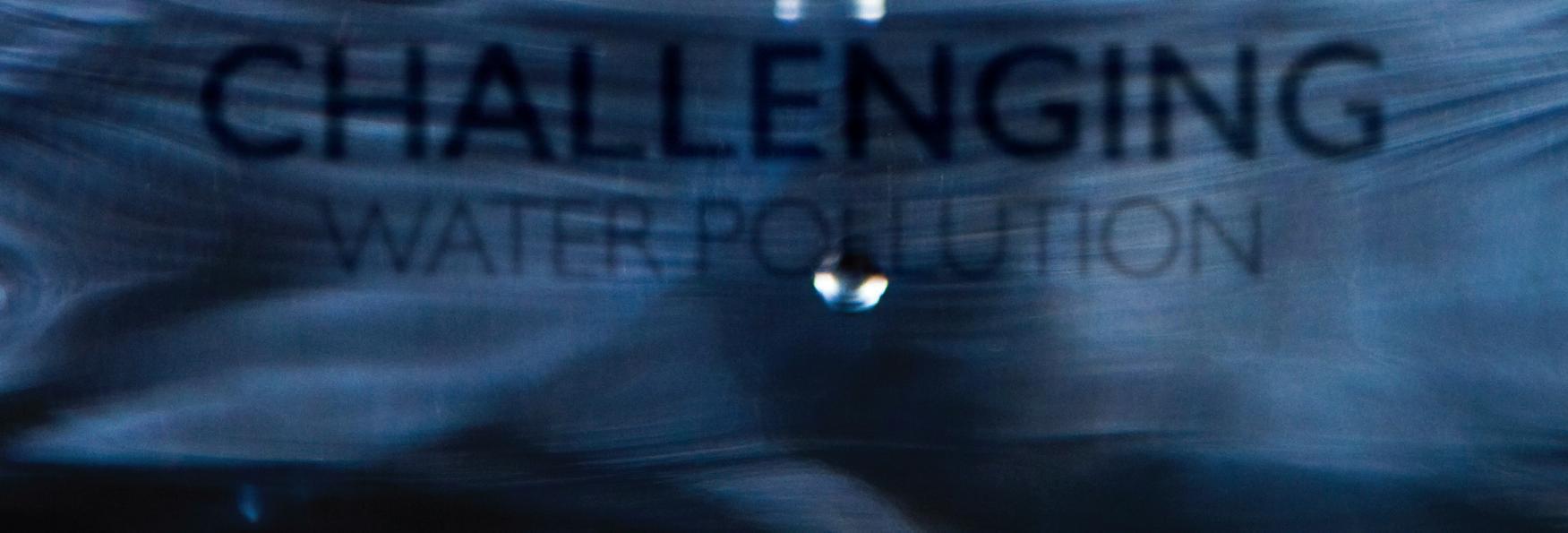

LAW IN PRACTICE
Lorna Madden BL

When it comes to matters of the environment it can be easy to feel disheartened, and indeed, for an individual looking to litigate an environmental issue, there seems little to recommend Ireland as a jurisdiction. When it comes to water pollution, however, the news is not all bad. Whereas most areas of environmental law require individuals or environmental non-governmental organisations (eNGOs) to bring costly High Court actions relating to rights or issues of EU law, in relation to water pollution the existing law is relatively well equipped to allow for more straightforward and accessible litigation. In particular, a readymade cause of action for eNGOS and individuals alike already seems to exist in section 10 of the Local Government (Water Pollution) Acts 1977-2007.
Water quality in Ireland – the current status
Although water quality in Ireland is generally considered to be high, the Environmental Protection Agency (EPA), in its latest report, made several conclusions that are cause for concern. In the report, ‘Water Quality in Ireland 2016-2021’, published in October 2022, the EPA sets out the latest assessment of the health of Ireland’s rivers, lakes, canals, groundwaters, and transitional (estuaries) and coastal waters.1 Water status is classified according to five ecological status classes of “high”, “good”, “moderate”, “poor” and “bad” in accordance with the Water Framework Directive.2 Water bodies with a status of bad, poor or moderate have altered ecosystems with impaired functions, and reduced diversity and resilience.3 The report shows that nearly half (46%) of the surface waters in Ireland are in
unsatisfactory condition. The most concerning conclusion is that the overall water quality within Ireland is going in the wrong direction and any improvements are being cancelled out by declines occurring elsewhere. The report states that water quality is declining and the number of water bodies in satisfactory condition has decreased since the previous EPA analysis of water quality in Ireland.
Among the key findings was the fact that only 36% of transitional water bodies (i.e., estuaries) are in high or good ecological status, meaning that there has been a marked decline of 15.7% since the last assessment. Although 81% of coastal water bodies are in high or good ecological status, there has been a 9.5% decline in the number of coastal water bodies in satisfactory condition. Finally, in relation to rivers, the report found that 43% of rivers have high nitrate concentrations.
A worrying aspect of this study is that it only shows the decline in water quality where a water body has dropped in its ecological status class. This means that the report isn’t taking into account detrimental changes to a body of water that do not result in it dropping to a lower status class.4
The cause of water pollution
The EPA’s report highlights that the run-off of nutrients, sediment and pesticides from agricultural lands and farmyards is one of the major problems, with concentrations of nitrogen and phosphorus being too high in many of the water bodies. Many rivers, mostly in the south and southeast the country, have high nitrate concentrations, while nearly onethird of rivers and one-third of lakes have elevated phosphorus concentrations. This causes so called algal bloom: the increase in the growth of plants and algae. This in turn clogs up water courses, uses up oxygen and harms other aquatic life such as insects and fish.
The report also highlights that a second major contributor to the declining water quality within Ireland is the discharge of poorly treated sewage from urban waste water treatment
53 LAW IN PRACTICE THE BAR REVIEW / Volume 28 / Number 2 / April 2023
With water quality in Ireland declining, it is heartening to know that existing legislation seems to provide an opportunity for individuals and organisations to take civil action against polluters.
Although water quality in Ireland is generally considered to be high, the Environmental Protection Agency (EPA), in its latest report, made several conclusions that are cause for concern.
plants. In a separate report on waste water treatment, ‘Urban Waste Water Treatment in 2021’, the EPA found that 32 towns and villages still released raw sewage into the environment every day, including the towns of Castletownsend, Whitegate and Ballycotton. It also found that 12 large urban areas did not treat sewage to the EU standards set to protect the environment, including Lahinch, Clonakilty, Kinsale, Ringaskiddy, Ringsend, and Malahide.5
The civil actions
Outside of the more traditional claims in tort, there are three sections of legislation that provide for specific civil actions when it comes to water pollution. It must be acknowledged that these provisions, in particular section 10, are somewhat under litigated, but in light of the current EPA, these sections may provide a valuable tool in challenging water pollution.
Section 20 of the Local Government (Water Pollution) (Amendment) Act 1990 provides that where trade sewage effluent or other polluting matter enters waters and causes injury, loss or damage to a person or property, the person may recover damages from the occupier of the premises from which the effluent or matter originated without prejudice to any other potential cause of action unless the entry to waters was caused by an act of God, or an act or omission by a third party over whose conduct the occupier had no control and that was not reasonably foreseeable by the occupier. Although a similar action could possibly be brought in tort, section 20 provides for the action to be brought where the polluting matter enters the water and causes injury, as opposed to where it negligently enters into the water, and regardless of whether the injury is foreseeable.
Section 10 of the Local Government (Water Pollution) Acts 1977-2007 is more broad and provides that where a person is causing or permitting polluting matter to enter waters, or is discharging trade effluent or sewage effluent to waters, not under licence, any person can apply to the appropriate court, whether or not that person has an interest in the waters concerned, and the court may make an order directing that other person to do one or more of the following:
1. To terminate the entry or discharge within such period as may be specified in the order.
2. To mitigate or remedy any effects of the entry or discharge concerned in such manner and within such period as may be specified in the order.
3. To pay to the applicant or such other person as may be specified in the order a specified amount to defray all or part of any costs incurred by the applicant or that other person in investigating, mitigating or remedying the effects of the entry or discharge concerned.
Pursuant to section 11 of the Local Government (Water Pollution) Acts 19772007, the High Court also has the power to provide injunctive relief and may
prohibit any person from causing or permitting, or continuing to cause or permit, the entry of polluting matter to waters or the discharge of trade or sewage effluent into waters. The Court may also make an order requiring the carrying out of specified measures by any person having the custody or control of polluting matter or trade or sewage effluent to prevent an entry or discharge or the continuance or recurrence of an entry or discharge.
“Polluting matter” includes any poisonous or noxious matter, and any substance the entry or discharge of which into waters is liable to render those or any other waters poisonous or injurious to fish, spawning grounds or the food of any fish, or to injure fish in their value as human food, or to impair the usefulness of the bed and soil of any waters as spawning grounds or their capacity to produce the food of fish, or to render such waters harmful or detrimental to public health or to domestic, commercial, industrial, agricultural or recreational uses.6
It is important at this juncture to point out that all three sections are subject to the caveat that the entry of trade effluent, sewage effluent or other polluting matter to waters in accordance with a licence will not give rise to a civil action.
Standing
Both section 10 and section 11 of the Local Government (Water Pollution) Acts 1977-2007 are of particular interest when it comes to the issue of standing. These sections clearly state that “any person” can apply to court, whether or not they have an interest in the waters concerned. From the point of view of eNGOs, concerned communities or even concerned citizens, these sections open the door to litigating the issue of water pollution by giving them standing and by giving a clear cause of action. In this manner, sections 10 and 11 eliminate the first hurdles encountered in many environmental actions. Taking this further, if we consider a situation where water pollution is affecting an individual but they are unwilling or unable to bring an action themselves, sections 10 and 11 essentially allow an eNGO to take an action on their behalf, subject to champerty and maintenance preventing the individual from funding the action.
Section 20 is much more limited in scope and provides that a person can only bring an action where they themselves have suffered injury, loss or damage
54 THE BAR REVIEW / Volume 28 / Number 2 / April 2023 LAW IN PRACTICE
There are three sections of legislation that provide for specific civil actions when it comes to water pollution.
as a result of trade sewage effluent or other polluting matter entering the water. This is still a useful provision, however, as it gives standing to a person who has suffered damage as a result of water pollution, but who does not have any legal interest in the water that is polluted. This may to help get over the first hurdle of standing in instances of, for example, recreational bathers, or the many businesses providing water-based activities throughout Ireland who may suffer loss or business interruption as a result of water pollution.
The appropriate court
An application pursuant to section 11 must be brought in the High Court, and the appropriate court for section 20 will be determined by the loss or damage incurred. An interesting aspect of section 10, however, is that an action can be brought in the District Court, Circuit Court or the High Court, and the appropriate court is determined, not by the nature of the remedy sought, but by the estimated cost of complying with an order of the court. Where the estimated cost does not exceed ¤15,000, the appropriate court is the District Court, and where it does not exceed ¤75,000, the appropriate court is the Circuit Court.7 Additionally, in proceedings brought under section 10, a court may make such interim or interlocutory orders as it considers appropriate. It does not appear that this power is limited to the Circuit or High Court.8 This is quite unusual but potentially beneficial for the purposes of promoting civil litigation in instances of water pollution cases as it may significantly reduce the costs involved in bringing an action.
In relation to section 10 and costs specifically, the section provides that the court may make such order as to the costs of the parties to or persons heard by the court as it considers appropriate.9 This is in addition to the remedy set out above, which provides that the court can order the payment of all or part of any costs incurred by the applicant or another person in investigating the effects of the entry or discharge concerned.
Licensed discharges
One of the biggest gaps in the legislation is that it exempts discharges that are carried out subject to licence. Irish Water, of course, operates pursuant to a licence, but it is not clear whether the discharge of poorly treated or untreated sewage by Irish Water is also exempted from civil litigation. This is an important issue when the EPA’s water quality report clearly highlights that the discharge of poorly treated sewage is a major contributor to the declining water quality within Ireland. In its urban waste water treatment report, the EPA identifies 38 areas where improvements in treatment need to be prioritised in order to protect inland and coastal waters adversely impacted by waste water discharges. It reports that Irish Water has been aware of most of these priority areas for several years but has not provided a clear time frame to improve treatment at almost three-quarters of these particular

locations. In the same report, the EPA also identifies 12 towns and villages where treatment needs to improve to protect endangered freshwater pearl mussels and observes that Irish Water has repeatedly failed to provide a clear time frame to carry out improvements at five of these areas. The question then has to be asked whether a civil action under section 10, section 11 or section 20 can be brought where the pollution is discharged pursuant to licence, but the entity is in breach of the licence. In Shannon Regional Fisheries Board v Cavan County Council10 the defendant Council was accused of an offence under s.171(1)(b) of the Fisheries (Consolidation) Act 1959, which provides that any person who empties, permits or causes to fall into any waters any deleterious matter, shall, unless such act is done under and in accordance with a licence granted by the Minister under this section, be guilty of an offence under this section....”
The District Court found, as a matter of fact, that deleterious matter from sewage treatment works owned and operated by the defendant had entered waters and that the sewage treatment works had been more than adequate for its district when constructed but had subsequently become inadequate. It was also found on the evidence that the Council had been seeking to have the sewage treatment works upgraded but did not have access to funds. It was held that there was no doubt that the Council had discharged imperfectly treated sewage into waters, and the fact that it said it had no alternative did not alter the character of what it had done. The case went to the Supreme Court to consider the issue of mens rea. What is interesting is that the issue of whether or not the Council was operating pursuant to a licence was not
55 THE BAR REVIEW / Volume 28 / Number 2 / April 2023
LAW IN PRACTICE
raised as a defence before the Court and the Court was clearly of the view that the defendant had no defence available to it.
Proving pollution
It would be remiss to discuss this issue without acknowledging the problem of proving water pollution. This is probably the trickiest issue when looking at cases of this kind, as pollution may only become evident when the effects of it are seen, as opposed to when it actually occurs. For example, although it is clear that intense agriculture is causing pollution of water bodies, it can be difficult if not impossible in many instances to trace exactly where the pollution is coming from when the water body may be surrounded or fed by multiple lands and sources. Actions where an entity is discharging trade effluent or sewage effluent may be easier to identify, although it will still have to be proved that there either is no licence or that the discharge is in breach of the licence. In any case, resources will have to be spent determining whether there is pollution in the first instance, and the source of pollution, before any litigation can be contemplated. A silver lining is that section 10 seems to allow a litigant to recoup the cost of investigating the effects of the pollution, although not necessarily the pollution itself. Additionally, there is a lot of public information available.
Directive 2006/7/EC (the Bathing Water Directive) makes provisions for the management of bathing water quality and the provision of information to the public on bathing water quality. This information can be accessed on www.beaches.ie, which provides information on bathing spots in Ireland from June to September, including on the quality of the water and whether a ‘no swim’ notice has been issued. Members of the public can also download historical information in relation to beaches, including whether there have been warnings issued for a beach due to pollution and the likely reasons for them. For example, a simple search shows that on Coolmaine beach, between June 18 and 23, 2021,
References
1. Environmental Protection Agency. ‘Water Quality in Ireland 2016-2021’.
2. Directive 2000/60/EC.
3. In case there was any doubt, the report includes a simple infographic (Figure 1.2 ) setting out the five ecological status classes illustrated by a happy fish for high quality water, down to a dead fish for bad quality water.
4. This approach is contrary to Bund für Umwelt und Naturschutz Deutschland e.V. v Bundesrepublik Deutschland (the Weser case) (C-461/13) EU:C:2015:433, where the CJEU held that there is “deterioration of the status” of a body of surface water for the purposes of Article 4 of the directive as soon as the status of at least one of the quality elements falls by one class, even if that fall does not result in a fall in classification of the body of surface water as a whole.
5. Environmental Protection Agency. ‘Urban Waste Water Treatment in 2021’.
bathing was prohibited. The likely source of pollution is described as “Urban Waste Water Agglomeration – EPA Licensed (any discharge/spill from known point of the urban waste water collection system including CSOs)” and the incident description provides: “Risk of deterioration in water quality due to discharges (breaching limits) from waste water treatment plant”.11 Although not sufficient to prove a case, information of this kind is invaluable.
Criminal prosecutions may also be a valuable source of information. Most prosecutions are brought in the District Court where a person or entity is subject to a maximum of a ¤5,000 fine.12 For a body such as Irish Water, the impact of such a prosecution is minimal. However, section 10 would allow for an order directing the offending person or entity to remedy the effects of the pollution.
Conclusion
A steady decline of water quality in Ireland is occurring despite the 2000 Water Framework Directive, which requires all member states to protect and restore water quality in all waters to a high status.13 Member states are supposed to achieve good water status by 2027, but the EPA’s water quality report concludes that Ireland will not achieve this. The actions being taken to protect Ireland’s water quality are simply not enough, especially when one of the major causes of the pollution is the poor treatment of waste water.
Poor water quality can affect the enjoyment and recreational use of beaches, rivers and lakes. It can have implications for tourism and businesses that rely on good quality water. Perhaps most importantly, it can have serious environmental consequences. Many Special Areas of Conservation14 and Special Protection Areas15 are found in or near Ireland’s estuaries. When it is considered that only 36% of estuaries are of high or good quality, this is particularly concerning. When it comes to water pollution, the legislation is there. For individuals or eNGOs looking to challenge water pollution, it may be the way to go about it.
6. Section 1 Local Government (Water Pollution) Acts 1977-2007.
7. Section 10(1)(b) Local Government (Water Pollution) Acts 1977-2007.
8. Section 10(1)(d) Local Government (Water Pollution) Acts 1977-2007.
9. Section 10(3)(b) Local Government (Water Pollution) Acts 1977-2007.
10. [1996] 3 IR 267.
11. www.beaches.ie. ‘Coolmaine Reported Historical Restrictions’.
12. Section 3(2) Local Government (Water Pollution) Acts 1977-2007.
13. Directive 2000/60/EC.
14. European Communities (Birds and Natural Habitats) Regulations 2011 (S.I. No. 477 of 2011).
15. EU Birds Directive (2009/147/EC).
56 THE BAR REVIEW / Volume 28 / Number 2 / April 2023 LAW IN PRACTICE
A directory of legislation, articles and acquisitions received in the Law Library from January 14, 2023, to March 10, 2023
Judgment information supplied by Justis Publishing Ltd.
Edited
ADMINISTRATIVE LAW
Library acquisitions
Bradley, A.W., Ewing, K.D., Knight, C. Constitutional and Administrative Law (18th ed.). United Kingdom: Pearson Education Ltd, 2022 – M31
Cahillane, L. Constitutional Law in Ireland (2nd ed.). Netherlands: Kluwer
Law International, 2020 – M31.C5
Craig, P. Administrative Law (9th ed.)
London: Sweet & Maxwell, 2021 –M300
Wade, W., Forsyth, C., Ghosh, J. Administrative Law (12th ed.). Oxford: Oxford University Press, 2022 – M300
AGRICULTURE
Statutory instruments
Agriculture Appeals Act 2001 (amendment of schedule) (no. 2) regulations 2022 – SI 743/2022
ARBITRATION
Library acquisitions
Schill, S. International Council for Commercial Arbitration Yearbook
Commercial Arbitration: Volume XLVII –2022. The Netherlands: Kluwer Law International, 2022 – N398.3
BANKING
Tender offer – Special circumstances –Unfairness – First defendant seeking leave to make a tender – Whether there was an unfairness to the plaintiffs in permitting a tender to be made –23/02/2023 - [2023] IEHC 86
Feely v Bank of Ireland Group Plc
Library acquisitions
Goode, R., Gullifer, L. Goode and Gullifer on Legal Problems of Credit and
Security (7th ed.). London: Sweet & Maxwell, 2022 – N303.2
Statutory instruments
Central Bank (Supervision and Enforcement) Act 2013 (section 48(1)) (investment firms) regulations 2023 – SI 10/2023
BROADCASTING
Acts
National Cultural Institutions (National Concert Hall) (Amendment) Act 2023 –Act 1/2023 – Signed on February 6, 2023
Statutory instruments
Broadcasting Act 2009 (establishment day) order 2023 – SI 72/2023
BUILDING LAW
Statutory instruments
Regulation of Providers of Building Works and Miscellaneous Provisions Act 2022 (appointment of registration body) order 2023 – SI 8/2023
CHARITY
Library acquisitions
Henderson, W., Fowles, J., Smith, J. Tudor on Charities (11th ed.). London: Sweet & Maxwell, 2022 – N215
CHILDREN
Statutory instruments
Assisted Decision-Making (Capacity) (Amendment) Act 2022 (commencement) order 2023 – SI 46/2023
CLUBS
Library acquisitions
Law Reform Commission. Law Reform Commission Consultation Paper No. 68 – Liability of Clubs, Societies and Other Unincorporated Associations. Dublin: Law Reform Commission, 2022 –L160.C5
COMMERCIAL LAW
Library acquisitions
Proctor, C. Mann and Proctor on the Law of Money (8th ed.). Oxford: Oxford University Press, 2022 – N300
COMPANY LAW
Security for costs – Prima facie defence – Surcharge interest – Defendants seeking security for costs – Whether the defendants had established a prima facie defence – 16/02/2023 – [2023] IEHC
85
Woodstock Golf and Country Club Ltd v Pepper Finance Corporation Ltd
Library acquisitions
Lamberigts, S. Corporations and the Privilege against Self-Incrimination London: Hart Publishing, 2022 – W111
COMPETITION LAW
Articles
McGovern, L., Egan, J. Competition law enforcement: a new era. Law Society Gazette 2023; Jan/Feb: 56-59
CONSTITUTIONAL LAW
Library acquisitions
Kavanagh, J. Constitutional Law in Ireland (2nd ed.). Dublin: Clarus Press Ltd, 2022 – M31.C5
CONSUMER LAW
Statutory instruments
Consumer Protection Act 2007 (competition and consumer protection commission) levy regulations 2023 – SI 48/2023
CONTRACT
Judicial review – Award of contract –Selection criteria – Applicant challenging the award of a contract – Whether the notice party satisfied the selection criteria for entry into the tender competition – 10/20/2023 – [2023]
IEHC 63
Sere Holding Ltd v HSE
Library acquisitions
Lawson, R. Exclusion Clauses and Unfair Contract Terms (13th ed.). London: Sweet & Maxwell, 2022 – N18.8
COPYRIGHT
Library acquisitions
Gibbons, G. Gibbons on Trade Marks
Law (3rd ed.) . Dublin: Clarus Press, 2022 – N114.2.C5
COURTS
Library acquisitions
Blackhall Publishing. Blackhall’s Circuit Court rules: updated to 1 January 2023 (15th ed.) . Dublin: Lonsdale Law Publishing, 2023 –N363.1.C5
Blackhall Publishing. Blackhall’s District Court rules: updated to 1 January 2023 (16th ed.) . Dublin: Lonsdale Law Publishing, 2023 –N363.2.C5
Blackhall Publishing. Blackhall’s Superior Court rules: updated to 1 January 2023 (16th ed.) . Dublin: Lonsdale Law Publishing, 2023 –N361.C5
Statutory instruments
Fines (Payment and Recovery) Act 2014 (section 6) (amendment) regulations 2023 – SI 9/2023
COSTS
Judicial review – Substantive orders –Costs – Applicants seeking an order of certiorari of the entire decision of the respondent under challenge –Whether the order sought by the applicants would not reflect the fact that the applicants were unsuccessful in respect of a number of their key grounds of challenge – 11/01/2023 – [2023] IEHC 2
Baynes v Financial Services and Pensions Ombudsman
Costs – Moot proceedings – Judicial review – Applicant seeking costs –Whether the proceedings were issued precipitously – 16/01/2023 – [2023]
IEHC 12
Islam v Commissioner of An Garda Síochána
Costs – Power of Attorney – Legal Services Regulation Act 2015 s. 169 –Appellant seeking costs – Whether costs should follow the event –20/01/2023 – [2023] IECA 8
Pepper Finance Corporation (Ireland) DAC v Moloney


ix
by Vanessa Curley, Susan Downes and Clare O’Dwyer, Law Library, Four Courts.
LEGAL UPDATE / Volume 28 / Number 2 / April 2023 UPDATE LEGAL VOLUME 28 / NUMBER 2 / APRIL 2023
Library acquisitions
Cook, M.J., Middleton, S., Rowley, J. Cook on Costs 2023: A Guide to Legal Remuneration in Civil, Contentious and Non-contentious Business
London: Butterworths LexisNexis, 2022 – L89
Articles
O’Sullivan, D. The party line. Law Society Gazette 2023; Jan/Feb: 40-43
CRIMINAL LAW
Sentencing – Burglary – Unfair hearing – Applicant seeking to quash a sentence of imprisonment imposed by the Circuit Court – Whether the Circuit Court judge’s refusal to allow counsel an opportunity to take instructions from the accused person resulted in an unfair hearing –11/01/2023 – [2023] IEHC 8
Connors v DPP
Sentencing – Assault causing harm –Undue leniency – Applicant seeking review of sentence – Whether sentence was unduly lenient –15/02/2023 – [2023] IECA 34
DPP v Buggy
Sentencing – Rape – Undue leniency – Applicant seeking review of sentence – Whether sentence was unduly lenient – 19/01/2023 –
[2023] IECA 9
DPP v C.P.
Sentencing – Manslaughter – General deterrence – Applicant seeking review of sentence – Whether the trial judge properly considered general deterrence – 20/01/2023 – [2023]
IECA 20
DPP v Corcoran
Sentencing – Causing serious harm –Financial compensation – Appellant seeking to appeal against sentence –Whether a voluntary offer of financial compensation is to be considered as a factor in mitigation – 19/01/2023 –[2023] IESC 1
DPP v Duffy
Sentencing – Human trafficking –Undue leniency – Applicant seeking review of sentences – Whether sentences were unduly lenient –20/02/2023 – [2023] IECA 38
DPP v Edosa and Enoghaghase
Crime and sentencing – Application by DPP – Whether sentence was unduly lenient – S 2 Criminal Justice Act 1993 – 23/01/2023 – [2023] IECA 12
DPP v Foley
Sentencing – Assault causing serious harm – Severity of sentence –Appellant seeking to appeal against sentence – Whether sentence was unduly severe – 30/01/2023 – [2023]
IECA 40
DPP v Groome
Conviction – Sexual assault – Perverse
verdicts – Appellant seeking to appeal against conviction – Whether the verdicts of the jury on the two counts on which they convicted by majority were perverse – 26/01/2023 – [2023]
IECA 14
DPP v J. O’C.
Sentencing – Possession of a firearm in suspicious circumstances – Severity of sentence – Appellant seeking to appeal against sentence – Whether sentence was unduly severe – 17/02/2023 –[2023] IECA 37
DPP v Kelly
Sentencing – Assault causing harm –Mitigation – Appellant seeking to appeal against sentence – Whether inadequate weight was attached to mitigation – 16/01/2023 – [2023]
IECA 41
DPP v McCabe
Sentencing – Defilement of a child under 15 years of age – Severity of sentence – Appellant seeking to appeal against sentence – Whether sentence was unduly severe – 21/02/2023 –[2023] IECA 42
DPP v P.N.
Conviction – Sexual offences – Risk of an unfair trial – Appellant seeking to appeal against conviction – Whether the trial judge erred in refusing to stop the trial on the grounds that there was a real risk of an unfair trial –16/01/2023 – [2023] IECA 4
DPP v R.C.
Criminal prosecution – Indecent assault – Unfair trial – Applicant seeking certiorari and declaratory relief preventing a criminal prosecution –Whether delay and the manner in which the case had been prosecuted created a real risk of an unfair trial –11/01/2023 –[2023] IEHC 3
F. v DPP
Library acquisitions
Harris, L., Walker, S. Sentencing Principles, Procedure and Practice 2023 (3rd ed.). United Kingdom: Sweet & Maxwell 2022 – M587
Articles
Reid O’Doherty, E., Gillane, S. Coercive control and stalking. The Bar Review 2022; 27(5): 130-133
Statutory instruments
Criminal Justice (Terrorist Offences) Act 2005 (section 42) (restrictive measures concerning certain persons and entities associated with the ISIL (Da’esh) and Al-Qaida organisations) regulations 2023 – SI 7/2023
Criminal Justice (Terrorist Offences) Act
2005 (section 42) (restrictive measures concerning certain persons and entities associated with the ISIL (Da’esh) and
Al-Qaida Organisations) (no. 2) regulations 2023 – SI 36/2023
Criminal Justice (Terrorist Offences) Act
2005 (section 42) (restrictive measures concerning certain persons and entities associated with the ISIL (Da’esh) and Al-Qaida organisations) (no. 3) regulations 2023 – SI 60/2023
Criminal Justice (Terrorist Offences) Act
2005 (section 42) (restrictive measures concerning certain persons and entities with a view to combating terrorism) regulations 2023 – SI 83/2023
DATA PROTECTION
Library acquisitions
Harbinja, E. Digital Death, Digital Assets and Post-Mortem Privacy United Kingdom: Edinburgh University Press, 2022 – M209.D5
DEFAMATION
Defamation – Extension of time –Prejudice – Applicant seeking an extension of time within which to bring a defamation claim against the respondents – Whether the prejudice that the applicant would suffer if the direction were not given would significantly outweigh the prejudice that the respondents would suffer if the direction were given –10/02/2023 – [2023] IEHC 84
Joyce v Mayo Travellers Support Group Defamation – Extension of time –Jurisdiction – Appellant seeking to extend time to bring defamation proceedings – Whether the trial judge had jurisdiction to extend time under s. 11 of the Statute of Limitations 1957 – 16/02/2023 – [2023] IECA 44
Reidy v Pasek Trial of a preliminary issue – Privilege – Defamation – Respondents seeking a trial in each action of a preliminary issue – Whether the publication upon which the appellant sued was protected by privilege – 12/01/2023 – [2023] IECA 1
Tracey v Independent Newspapers (Ireland) Ltd
Time limit – Cause of action – Bound to fail – Defendant seeking an order dismissing the plaintiff’s proceedings – Whether the proceedings were issued outside the time limit prescribed by s. 11(2)(c) of the Statute of Limitations 1957 –08/02/2023 – [2023] IHEC 56
X. v Google Ireland Ltd
DISCOVERY
Library acquisitions
Bushell, S., Milner-Moore, G. Disclosure of Information: Norwich Pharmacal and Related Principles (3rd ed.) . Haywards Heath: Bloomsbury Professional, 2023 – N386
EASEMENTS
Library acquisitions
Gaunt, J., Morgan, The Honourable Mr Justice. Gale on Easements (21st ed.) London: Sweet & Maxwell, 2020 –N65.1
EDUCATION
Protective costs order – Public interest litigation – Exceptional jurisdiction –Applicants seeking protective costs orders – Whether the proceedings were of general public importance –16/02/2023 – [2023] IEHC 80
S. v Minister for Education; M. v Minister for Education
Statutory Instruments
Teaching Council (registration) (amendment) regulations 2023 – SI 12/2023
ELECTORAL
Statutory instruments
Electoral Reform Act 2022 (establishment day) order 2023 – SI 31/2023
Electoral Reform Act 2022 (commencement) order 2023 – SI 32/2023
EMPLOYMENT LAW
Library acquisitions
Adams-Prassl, J., Bogg, A., Davies, A.C.L. Landmark Cases in Labour Law United Kingdom: Hart Publishing, 2022 – N192
Articles
McGreal, C. Legal remedies and defences in online workplace harassment cases. Irish Employment Law Journal 2022;19 (3): 76-82 [part 1]; Irish Employment Law Journal 2022: 19 (4): 107-114 [part 2]
ENERGY
Statutory instruments
National Oil Reserves Agency Act 2007 (renewable transport fuel obligation buy-out charge) regulations 2023 – SI 43/2023
National Oil Reserves Agency Act 2007 (advanced biofuel obligation buy-out charge) regulations 2023 – SI 44/2023
Finance Act 2022 (temporary business energy support scheme) (energy costs threshold aggregate amount) order 2023 – SI 73/2023
Finance Act 2022 (temporary business energy support scheme) (energy costs threshold aggregate amount) (no. 2) order 2023 – SI 74/2023
Finance Act 2022 (temporary business energy support scheme) (specified period) order 2023 – SI 75/2023
x LEGAL UPDATE / Volume 28 / Number 2 / April 2023
LEGAL UPDATE
EQUALITY
Articles
Larkin, M. If you can’t see it, you can’t be it. Law Society Gazette 2023; Jan/Feb: 36-39
EUROPEAN UNION
Library acquisitions
Barbosa, R., Glerum, V., Kijlstra, H., Klip, A. Improving the European Arrest Warrant . The Hague: Eleven, 2023 – W133.2
Douma, S., Marres, O., Vermeulen, H., Weber, D. European Tax Law: Volume 1 General Topics and Direct Taxation (8th ed.). The Netherlands: Kluwer Law International, 2022 –W103
Waas, B. Restatement of Labour Law in Europe Vol III . Oxford: Hart
Publishing 2023 – W130
Articles
Grehan, D. We shall fight them on the breaches. Law Society Gazette 2023; March: 38-43
Statutory instruments
European Union (restrictive measures concerning Libya) (no.4) regulations
2022 – SI 742/2022
European Union (food and feed hygiene) (amendment) regulations
2022 – SI 744/2022
European Union (restrictive measures concerning Ukraine) regulations
2023 – SI 17/2023
European Union (restrictive measures concerning Somalia) regulations
2023 – SI 18/2023
European Union (money laundering and terrorist financing) (use of financial and other information) regulations 2023 – SI 22/2023
European Union (customs) regulations 2023 – SI 26/2023
European Union (basic safety standards for protection against dangers arising from medical exposure to ionising radiation) (amendment) regulations 2023 – SI 29/2023
European Union (restrictive measures concerning Ukraine) (no.20) regulations 2023 – SI 35/2023
European Union habitats (Tullaher Lough and Bog special area of conservation 002343) regulations
2023 – SI 37/2023
European Union habitats (Magheradrumman Bog special area of conservation 000168) regulations
2023 – SI 38/2023
European Union habitats (Barroughter Bog special area of conservation 000231) regulations
2023 – SI 39/2023
European Union habitats (Comeragh
Mountains special area of conservation 001952) regulations 2023 – SI 40/2023
European Union habitats (Lough Ennell special area of conservation 000685) regulations 2023 – SI 41/2023
European Union (official controls in relation to food legislation) (imports of food of non-animal origin) (amendment) regulations 2023 – SI 50/2023
European Union (restrictive measures concerning Iraq) regulations 2023 – SI 51/2023
European Union (restrictive measures concerning Somalia) (No. 2) regulations 2023 – SI 52/2023
European Union (restrictive measures concerning Yemen) regulations 2023 –SI 53/2023
European Union (merchant shipping) (organisation of working time) (amendment) regulations 2023 – SI 59/2023
European Union (good agricultural practice for protection of waters) (amendment) regulations 2023 – SI 62/2023
European Union (restrictive measures in respect of Myanmar/Burma) regulations 2023 – SI 64/2023
European Union (restriction of certain hazardous substances in electrical and electronic equipment) (amendment) regulations 2023 – SI 67/2023
European Union (restrictive measures concerning Ukraine) (no.3) regulations 2023 – SI 78/2023
European Union (restrictive measures concerning Mali) regulations 2023 – SI 79/2023
European Union (restrictive measures concerning Belarus) regulations 2023 –SI 84/2023
European Union (sustainability related disclosures in the financial services sector) (occupational pension schemes) regulations 2023 – SI 86/2023
EVIDENCE
Articles Robinson, D. Bitten by the bug. Law Society Gazette 2023; Jan/Feb: 48-51
FAMILY LAW
Judicial review – Access – Care order –Applicant challenging orders concerning her access to her grandchildren – Whether a more appropriate alternate remedy was available – 16/01/2023 – [2023] IEHC 17
L.L. v The Child and Family Agency
Library acquisitions
Kingston, S., Sheridan, D. Family Law Arbitration: Practice and Precedents
United Kingdom: Bloomsbury Publishing, 2022 – N170
FINANCIAL SERVICES
Statutory instruments
Financial Services and Pensions
Ombudsman Act 2017 (Financial Services and Pensions Ombudsman Council) financial services industry levy regulations 2023 – SI 6/2023
FISHERIES
Statutory instruments
Sea-fisheries (technical Measures) (Amendment) Regulations 2023 – SI
13/2023
Sea-fisheries (north western waters landing obligation) (amendment) regulations 2023 – SI 47/2023
GOVERNMENT
Statutory instruments
Enterprise, trade and employment (delegation of ministerial functions) order 2023 – SI 14/2023
Enterprise, trade and employment (delegation of ministerial functions) (no. 2) order 2023 – SI 15/2023
Public expenditure and reform (alteration of name of department and title of minister) order 2023 – SI
19/2023
Finance (delegation of ministerial functions) order 2023 – SI 27/2023
Tourism, Culture, Arts, Gaeltacht, Sport and Media (delegation of ministerial functions) order 2023 – SI
33/2023
Tourism, Culture, Arts, Gaeltacht, Sport and Media (delegation of ministerial functions) (no. 2) order 2023 – SI 34/2023
Appointment of special advisers (Minister for Finance) order 2023 – SI
45/2023
Appointment of special adviser (Minister of State at the Department of Transport) order 2023 – SI 54/2023
Appointment of special adviser (Minister of State at the Department of Tourism, Culture, Arts, Gaeltacht, Sport and Media) order 2023 – SI
57/2023
Appointment of special adviser (Minister for Social Protection) order 2023 – SI 61/2023
Appointment of Special Adviser (Minister for Rural and Community Development) Order 2023 – SI
69/2023
Appointment of Special Adviser (Minister of State at the Department of Rural and Community Development) Order 2023 – SI 70/2023
Appointment of special advisers (Minister for Enterprise, Trade and
Employment) order 2023 – SI 80/2023
Appointment of special advisers (leader and Minister for the Environment, Climate and Communications) order 2023 – SI 85/2023
Public expenditure, national development plan delivery and reform (delegation of ministerial functions) order 2023 – SI 88/2023
Justice (delegation of ministerial functions) order 2023 – SI 91/2023
Health (delegation of ministerial functions) order 2023 – SI 92/2023
HEALTH
Statutory instruments
Misuse of drugs (prescription and control of supply of cannabis for medical use) (amendment) regulations 2023 – SI 5/2023
Medicinal products (prescription and control of supply) (amendment) regulations 2023 – SI 11/2023
Health and Social Care Professionals Act 2005 (section 95(3)) (variation of title: chiropodist) regulations 2023 –SI 55/2023
HOUSING
Statutory instruments
Affordable housing regulations 2023 –SI 20/2023
Affordable housing (no.2) regulations 2023 – SI 21/2023
Tailte Éireann Act 2022 (commencement) order 2023 – SI 58/2023
Tailte Éireann Act 2022 (establishment day) order 2023 – SI 66/2023
Housing loans (amendment) regulations 2023 – SI 76/2023
IMMIGRATION
Judicial review – Residency –Revocation – Applicant seeking an order of certiorari in respect of the decision of the first respondent –Whether the first respondent misconstrued her powers under the European Communities (Free Movement of Persons) Regulations
2015 – 11/01/2023 – [2023] IEHC 1
A.K.S (a minor suing by her mother and next friend J.K.) and guardian S.S v The Minister for Justice, Ireland and The Attorney General
Judicial review – Residence permission – Retention – Applicant seeking an order of certiorari quashing the decision of the respondent to refuse a residence card to the applicant –Whether the decision was taken in breach of the requirements of fair procedures by reason of a failure to disclose the material relied upon in
xi LEGAL UPDATE LEGAL UPDATE / Volume 28 / Number 2 / April 2023
advance – 01/02/2023 - [2023] IEHC 40
I.T. v Minister for Justice
Subsidiary protection – Country of origin information – Credibility –Applicant seeking judicial review of the first respondent’s decision to refuse to recognise the applicant as a refugee and/or as a person entitled to subsidiary protection – Whether the first respondent erred in its approach to the country of origin information –11/01/2023 – [2023] IEHC 6
K. (Zimbabwe) v International Protection Appeals Tribunal
Unlawful detention – European arrest warrant – Citizenship Directive –Appellant appealing against the refusal to order the respondent to produce the body of the appellant and to certify the grounds of his detention – Whether the appellant’s application was misconceived – 05/01/2023 –[2023] IECA 2
Kairys v The Governor of Cloverhill Prison
INJUNCTIONS
Contempt of court – Interlocutory injunctions – Fine – Plaintiff seeking an order for the sequestration of the defendant’s assets for failure to comply with orders of the High Court –Whether the defendant ought to be subject to a fine – 26/01/2023 –[2023] IEHC 36
The Board of Management of Wilson’s Hospital School v Burke
Interlocutory injunction – Receivership – Fair issue – Plaintiffs seeking an interlocutory injunction restraining the receivers of the defendants from acting as receivers of a commercial property –Whether there was a fair issue to be tried – 27/02/2023 – [2023] IEHC 35
Coughlan v O’Brien
Interlocutory injunction – Balance of convenience – Balance of justice –Plaintiff seeking an interlocutory injunction – Whether the balance of justice favoured the granting of injunctive relief – 20/01/2023 –[2023] IEHC 24
Merck Sharp & Dohme LLC v Mylan Ire Healthcare Ltd and Mylan Ireland Ltd and McDermott Laboratories T/A as Gerard Laboratories T/A as Mylan Dublin
Interlocutory injunctions – Sale of property – Receivership – Plaintiff seeking an interlocutory injunction restraining the first, second and third defendants from taking any steps to sell or market the lands in dispute –Whether there was a fair issue to be tried – 09/02/2023 – [2023] IEHC 77
Monkswood Investments Ltd v Everyday Finance DAC
Interlocutory injunction – Balance of
justice – Adequacy of damages –
Appellant appealing against an order granting the respondents an interlocutory injunction – Whether the trial judge correctly analysed the balance of justice – 23/01/2023 –[2023] IECA 10
Plus Development LLC v Lens Media Ltd
Trespass – Injunctions – Adjournment
– Respondent seeking various forms of injunction against trespass by the appellant – Whether there was a breach of the appellant’s rights to natural and constitutional justice in the refusal to adjourn the plenary hearing – 08/02/2023 – 2023] IECA 23
Tarbutus Ltd v Hogan
INSOLVENCY
Order for possession – Leave to issue execution – Order 42, rule 24 of the Rules of the Superior Courts – Plaintiff seeking leave to issue execution in respect of an order for possession –Whether the plaintiff had met the threshold of establishing a good reason that explained the failure to execute the order for possession –16/01/2023 – [2023] IEHC 11
Start Mortgages DAC v Hendrick
Articles
Phelan, J. Going for broke. Law Society Gazette 2023; March: 18-21
INSURANCE
Insurance – Contractual interpretation
– Breach of fair procedures – Appellant appealed from a decision of the respondent dismissing a complaint made by an insured against the appellant – Whether the respondent purported to make findings on the interpretation of the relevant contract of insurance without applying the proper principles of contractual interpretation – 21/02/2023. –[2023] IEHC 74
Chubb European Group S.E. v Financial Services and Pensions Ombudsman
Library acquisitions
De Azevedo, C. Cyber Risks Insurance: Law and Practice (2nd ed.). London: Sweet & Maxwell Ltd, 2022 – N290
INTERNATIONAL LAW
Articles Lee, R. Boiling point. Law Society Gazette 2023; March: 28-31
Little, C. Screen time for FDI. Law Society Gazette 2023; March): 52-55
JUDICIAL REVIEW
Judicial review – Compensation –
Injurious affection – Applicant seeking judicial review – Whether the Electricity (Supply) Act 1927 incorporates a right to compensation for injurious affection – 22/02/2023 – [2023] IEHC 83
Electricity Supply Board v Good
LANDLORD AND TENANT
Tenancy – Statutory time limit – Error of law – Appellant seeking to appeal the respondent’s determination that the landlord was not in breach of s. 56 of the Residential Tenancies Act 2004 and that the landlord was entitled to retain the security deposit – Whether the appeal was out of time –16/02/2023 – [2023] IEHC 81
Abeyneh v Residential Tenancies Board
Landlord and tenant – Leased premises – Fixtures – Plaintiff seeking declaration that works form part and parcel of premises – Whether works constitute landlord’s fixtures –20/01/2023 – [2023] IEHC 25
RGRE Grafton Ltd v Bewley’s Café Grafton Street Ltd
Library acquisitions
Dowding, N. Reynolds, K., Oakes, A. Dilapidations: The Modern Law and Practice (7th ed.). London: Sweet & Maxwell, 2021 – N88.4
LEGAL PROFESSION
Judicial review – Adjournment –Jurisdiction – Appellant appealing from the decision refusing the appellant’s application for judicial review of the decision of the respondent – Whether the lack of jurisdiction alleged by the appellant had been conclusively demonstrated – 17/01/2023 – [2023] IECA 3
O’Callaghan v The Solicitors Disciplinary Tribunal
Library acquisitions
The Bar of Ireland, McCann, P. Barrister’s Professional Conduct Tribunal 2015 Annual Report. Dublin: The Bar of Ireland, 2015 – L86.C5 Jowitt, J. Agency, Morality and Law
United Kingdom: Hart Publishing, 2023 – L82
Articles
Carty, J., White, P. Done the state some service. Law Society Gazette 2023; March: 32-37
Donelan, E. Mind your language. Law Society Gazette 2023; March: 44-47
Hardiman, A.-M. Father of the Bar. The Bar Review 2022; 27 (5): 127-129 Judge, M. Methods of dramatically
increasing judicial capacity. The Bar Review 2022; 27 (5): 138-141
MEDICAL LAW
Articles
Hanratty, R. Retention of human tissue after death – the law or lack thereof. Medico-Legal Journal of Ireland 2022; 28 (1): 26-28
Kelly, G. Determination of suicide in coronial proceedings: considering the merits of Maughan. Medico-Legal Journal of Ireland 2022; 28 (1): 1624
Kelly, K. The future of assisted dying in Ireland. Medico-Legal Journal of Ireland 2022; 28 (1): 4-13
NEGLIGENCE
Negligence – Apportionment of liability – Novus actus interveniens –Second and third defendants appealing against the High Court’s determination that they bore sole responsibility for the plaintiff’s injuries – Whether liability ought to have been apportioned between the second and third defendants and the first defendant – 23/02/2023 –[2023] IECA 39
Davey v Sligo County Council
Library acquisitions
Daly, C., Treacy, P. Medical Negligence Litigation in Ireland: Current Issues and Approaches. Dublin: Clarus Press, 2022 – N33.71.C5
OFFICIAL LANGUAGES
Statutory instruments
Official Languages (Amendment) Act 2021 (commencement) order 2023 –SI 90/2023
PENSIONS
Statutory instruments
Ordnance Survey Ireland superannuation scheme 2023 – SI 42/2023
PERSONAL INJURIES
Personal injuries – Damages –Negligence – Plaintiff seeking damages for personal injuries –Whether the accident was caused by the negligence of the defendants –11/01/2023 – [2023] IEHC 10
Allen v Clonshire Equestrian Centre
Personal injuries – Damages –Amendment – Plaintiff seeking permission to amend the particulars of claim contained on his personal injuries summons as issued –Whether the amendments would cause significant prejudice to the first defendant – 10/02/2023 – [2023]
IEHC 64
xii LEGAL UPDATE / Volume 28 / Number 2 / April 2023 LEGAL UPDATE
Behan v Deering Transport Ltd
Personal injuries – Accord and satisfaction – Trial of a preliminary issue – Defendant seeking an order directing the trial of a preliminary issue – Whether the plaintiff’s claim against the defendant had been compromised by reason of accord and satisfaction –23/01/2023 – [2023] IEHC 27
Singh v Corbertt
Articles
Gilhooly, S. Equality of arms. Law Society Gazette 2023; Jan/Feb: 18-19
Statutory instruments
Personal Injuries Resolution Board Act 2022 (commencement of certain provisions) order 2023 – SI 28/2023
PLANNING AND ENVIRONMENTAL LAW
Costs – Protected costs agreement –Planning and Development Act 2000 s.50B(4) – Applicant seeking costs –Whether there was an added onus on the applicant to be efficient with court time – 24/01/2023 – [2023] IEHC 28
Hayes v Environmental Protection Agency
Judicial review – Planning –Development plan – Applicant seeking an order of certiorari quashing the decision of the respondent granting permission to the notice party –Whether the respondent complied with the development plan –27/01/2023 – [2023] IEHC 26
Sherwin v An Bord Pleanála
Certiorari – Exempted development –Directive 2011/92/EU – Applicant seeking an order of certiorari quashing an order declaring that the construction of a grid connection was exempted development – Whether the declaration was in breach of Directive 2011/92/EU – 17/02/2023 – [2023] IEHC 89
Sweetman v An Bord Pleanála
Library acquisitions
Mynors, C. The Law of Trees, Forests and Hedges (3rd ed.). London: Sweet & Maxwell, 2022 – N88.T6
Articles Hallissey, M. In-house lawyers drive climate action. Law Society Gazette 2023; Jan/Feb: 44-47
Smith, G. The change agent. Law Society Gazette 2023; Jan/Feb: 26-31
Statutory instruments
Planning and Development and Foreshore (Amendment) Act 2022 (commencement) order 2023 – SI 1/2023
Waste management (prohibition of
waste disposal by burning) (amendment) regulations 2023 – SI 16/2023
Circular Economy and Miscellaneous
Provisions Act 2022 (commencement of certain provisions) order 2023 – SI 49/2023
Oil Emergency Contingency and Transfer of Renewable Transport Fuel Functions Act 2023 (commencement) order 2023 – SI 81/2023
Oil Emergency Contingency and Transfer of Renewable Transport Fuel Functions Act 2023 (vesting day) (part 3) order 2023 – SI 82/2023
POWERS OF ATTORNEY
Articles
Doyle, N., Sheehy, A., Watchorne, N. Great power, great responsibility. Law Society Gazette 2023; Jan/Feb: 3235
PRACTICE AND PROCEDURE
Case management – Stay –Directions – Defendant seeking a stay on the progress of the action pending the determination of his appeals – Whether the balance of convenience supported granting a stay – 31/01/2023 – [2023] IEHC 41
The Board of Management of Wilson’s Hospital School v Burke
Case management – Directions –Hearing – Defendant seeking an expedited hearing – Whether there was a need for witness statements –14/02/2023 – [2023] IEHC 78
The Board of Management of Wilson’s Hospital School v Burke Court order – Amendment – Order 28, rule 11 of the Rules of the Superior Courts – Third plaintiff seeking to amend a court order –Whether the court order accurately reflected the events at the hearing –27/01/2023 – [2023] IEHC 38
Dowling v Ireland
Abuse of process – Bound to fail –Strike out – Defendants seeking orders striking out the proceedings –Whether the proceedings disclosed no reasonable cause of action –30/01/2023 – [2023] IEHC 39
Farrington v Tennant
Want of prosecution – Delay –
Balance of justice – Defendant seeking to strike out the plaintiff’s action for delay and want of prosecution – Whether the delay in the case was excusable –10/02/2023 – [2023] IEHC 60
G.K. v St John of God Trust
Strike out – Fair trial – Access to the courts – Appellant appealing from orders directing that his motion to amend his pleadings and to join a third party be struck out and that his statement of claim be struck out –Whether the judge erred in law in striking out the proceedings in their entirety – 27/03/2023 – [2023]
IECA 43
McAndrew v Launceston Property Finance DAC
Clerical mistakes – Correction – Stay – Appellant seeking an order correcting mistakes in the judgment of the Court of Appeal – Whether consent should be sought before any motion is sought to be issued –30/01/2023 – [2023] IECA 13
Scotchstone Capital Fund Ltd v Ireland
Library acquisitions
Canny, M. Limitation of Actions (3rd ed.) . Dublin: Round Hall, 2022 –N355.C5
Articles
Bracken Ziad, A. Isaac Wunder Orders and Administrative Tribunals. The Bar Review 2022; 27 (5): 134-137
PRISONS
Bail – Release – Bail Act 1997 s. 5(4) – Appellant appealing against the order of the High Court directing the release of the respondent pursuant to Article 40.4.2 of the Constitution – Whether the trial judge erred in law in finding that the District Court had no power in fixing terms of appeal bail relating to a juvenile, which included a requirement that an adult independent surety lodge cash –26/01/2023 – [2023] IECA 36
C (a minor) v The Governor of Oberstown Children Detention Campus
False imprisonment – Damages –Liability – Plaintiffs seeking damages – Whether the first defendant was liable in false imprisonment –12/01/2023 – [2023] IEHC 13
O’Farrell v The Governor of Portlaoise Prison
PROBATE
Library acquisitions
Normington, J. Digital Assets and Probate: A Practitioner’s Guide United Kingdom: Wildy, Simmonds and Hill Publishing, 2022 – N127
Articles
Hammond, R. Return of the zombie will. Law Society Gazette 2023; March: 22-27
PROFESSIONS
Library acquisitions
Mills, S., Scott-Byrne, C. Disciplinary Procedures in the Statutory Professions (2nd ed.) . Haywards Heath: Bloomsbury Professional, 2022 – M303.C5
PROPERTY
Library acquisitions
Law Society of Ireland. Law Society of Ireland Conditions of Sale 2019 Edition (2019 ed.) . Dublin: Law Society of Ireland, 2019 – N73.C5 Tanfield Chambers. Service Charges and Management (5th ed.). London: Sweet & Maxwell, 2021 – N54.6
Statutory instruments
Tailte Éireann Act 2022 (commencement) (no. 2) order 2023 – SI 77/2023
PUBLIC SERVICE
Statutory instruments
Public Service Pay and Pensions Act 2017 (section 42) (payments to general practitioners) (amendment) regulations 2023 – SI 30/2023
REGULATORY LAW
Statutory instruments
Online Safety and Media Regulation Act 2022 (commencement) order 2023 – SI 71/2023
RESTITUTION
Library acquisitions
Mitchell, C., Mitchell, P., Watterson, S. Goff & Jones: On Unjust Enrichment (10th ed.). London: Sweet & Maxwell, 2022 – N20.2
ROAD TRAFFIC
Case stated – Rebuttal of presumption – Road Traffic Act 2010 s. 17(4) – Case stated by the District Court for the opinion of the High Court – Whether the evidence before the District Court amounted to sufficient evidence to rebut the presumption arising in s. 17(4) of the Road Traffic Act 2010 –17/02/2023 – [2023] IEHC 76
DPP v Barry
Statutory instruments
Road traffic (national car test) (amendment) regulations 2023 – SI 4/2023
SOCIAL WELFARE
Social welfare benefits – Statutory interpretation – Social Welfare (Consolidated Claims Payments and Control) Regulations 2007 –Appellants seeking benefits –
xiii LEGAL UPDATE LEGAL UPDATE / Volume 28 / Number 2 / April 2023
Whether the trial judge erred in her interpretation of the Social Welfare (Consolidated Claims Payments and Control) Regulations 2007 –31/01/2023 – [2023] IECA 16
Brennan v The Minister for Employment Affairs and Social Protection; Bracken v The Minister for Employment Affairs and Social Protection
STATISTICS
Statutory instruments
Statistics (producer prices survey) order 2023 – SI 2/2023
Statistics (delegation of ministerial functions) order 2023 – SI 3/2023
TAXATION
Case stated – Statutory interpretation – Taxes Consolidation Act 1997 s. 29(3) – Respondent requesting that the Appeal Commissioner state a case for the opinion of the High Court – What is the meaning of the phrase “land in the State” in s. 29(3)(a) of the Taxes Consolidation Act 1997? –14/02/2023 – [2023] IEHC 72
Cintra Infraestructureas Internacional SLU v The Revenue Commissioners Case stated – Point of law –Jurisdiction – Appellant seeking a case stated on a point of law – Whether the sale of property constituted a sale of development land – 19/01/2023 –[2023] IEHC 15
McNamara v The Revenue Commissioners
TORT
Well charging order – Order for sale –Statute barred – Plaintiff seeking a well charging order and an order for sale –Whether the proceedings were statute barred – 11/01/2023 – [2023] IEHC 7
Promontoria (Oyster) DAC v Kearney
Articles
McInerney, T., Brennan, P. Shock therapy. Law Society Gazette 2023; Jan/Feb: 20-25
TRANSPORT
Statutory instruments
Air Navigation and Transport Act 2022 (commencement) order 2022 – SI 741/2022
Irish Aviation Authority (flying displays) order 2023 – SI 23/2023
Irish Aviation Authority (unmanned aircraft systems (drones)) order 2023 –SI 24/2023
Irish Aviation Authority (upper airspace and rockets) order 2023 – SI 25/2023
Air Navigation and Transport Act 2022
(section 69) (commencement) order 2023 – SI 65/2023
Bills initiated in Dáil Éireann during the period January 14, 2023, to March 10, 2023
[pmb]: Private Members’ Bills are proposals for legislation in Ireland initiated by members of the Dáil or Seanad. Other Bills are initiated by the Government.
Broadcasting (amendment) bill 2023 –Bill 14/2023 [pmb] – Deputy Patrick Costello
Civil defence bill 2023 – Bill 5/2023
Commission for future generations bill 2023 – Bill 8/2023 [pmb] – Deputy Marc Ó Cathasaigh
Commission of investigation (collusion of British State Forces) bill 2023 – Bill 13/2023 [pmb] – Senator Peadar
Tóibín
Court proceedings (delays) bill 2023 –Bill 17/2023
Criminal justice (engagement of children in criminal activity) bill 2023 –Bill 4/2023
Criminal justice (public order)
(amendment) bill 2023 – Bill 11/2023
[pmb] – Deputy Peadar Tóibín
Electricity regulation (amendment) (protection of financially vulnerable customers) bill 2023 – Bill 15/2023
[pmb] – Deputy Jennifer Whitmore Environmental Protection Agency (emergency electricity generation)
(amendment) bill 2023 – Bill 18/2023
Health (regulation of termination of pregnancy) (amendment) bill 2023 –Bill 10/2023 [pmb] – Deputy Bríd Smith, Deputy Mick Barry, Deputy Richard Boyd Barrett, Deputy Gino Kenny, Deputy Paul Murphy Oil emergency contingency and transfer of renewable transport fuels functions bill 2023 – Bill 1/2023
Policing, security and community safety bill 2023 – Bill 3/2023
Public art mural (exempted development) bill 2023 – Bill 9/2023
[pmb] – Deputy Eoin Ó Broin Standards in public office (amendment) bill 2023 – Bill 16/2023
[pmb] – Deputy Mairéad Farrell and Deputy Pat Buckley
Veterinary medicinal products, medicated feed and fertilisers regulation bill 2023 – Bill 7/2023
Bills initiated in Seanad Éireann during the period January 14, 2023, to March 10, 2023
Domestic violence (amendment) bill 2023 – Bill 12/2023 [pmb] – Senator Vincent P. Martin, Senator Victor Boyhan, Senator Tom Clonan, Senator Mark Wall, Senator Rebecca Moynihan,
Senator Annie Hoey, Senator Marie Sherlock, Senator Michael McDowell, Senator David P.B. Norris, Senator Mary Seery Kearney, Senator Pauline O’Reilly, and Senator Róisín Garvey Historic and archaeological heritage bill 2023 – Bill 2/2023
Remuneration information and pay transparency bill 2023 – Bill 6/2023
[pmb] – Senator Catherine Ardagh and Senator Ollie Crowe
Progress of Bills and Bills amended in Dáil Éireann during the period January 14, 2023, to March 10, 2023
Agricultural and food supply chain bill 2022 – Bill 120/2022 – Committee Stage
Central Bank (individual accountability framework) bill 2022 – Bill 75/2022 –Report Stage – Passed by Dáil Éireann
Courts and civil law (miscellaneous provisions) bill 2022 – Bill 84/2022 –Report Stage – Passed by Dáil Éireann
Criminal justice (incitement to violence or hatred and hate offences) bill 2022
– Bill 105/2022 – Committee Stage
Criminal justice (mutual recognition of custodial sentences) bill 2021 – Bill 103/2021
Report Stage – Passed by Dáil Éireann
Mother and baby institutions payment scheme bill 2022 – Bill 97/2022 –Report Stage – Passed by Dáil Éireann
Oil emergency contingency and transfer of renewable transport fuels functions bill 2023 – Bill 1/2023 –Committee Stage – Passed by both Houses of the Oireachtas
Patient safety (notifiable patient safety incidents) bill 2019 – Bill 100/2019 – Passed by Dáil Éireann
Regulation of lobbying (amendment) bill 2022 – Bill 85/2022 – Report Stage
Screening of third country transactions bill 2022 – Bill 77/2022 – Committee Stage
Progress of Bill and Bills amended in Seanad Éireann during the period January 14, 2023, to March 10, 2023
Central Bank (individual accountability framework) bill 2022 – Bill 75/2022 –Committee Stage – Report Stage
Historic and archaeological heritage bill 2023 – Bill 2/2023 – Committee Stage
Road traffic and roads bill 2021 – Bill 128/2021 – Committee Stage
Sex offenders (amendment) bill 2021 – Bill 144/2021 – Committee Stage
Work life balance and miscellaneous provisions bill 2022 – Bill 92/2022 –Committee Stage – Report Stage
For up-to-date information, please check the following websites: Bills and legislation http://www.oireachtas.ie/parliament/ http://www.taoiseach.gov.ie/eng/Taoi seach_and_Government/Government _Legislation_Programme/
Supreme Court determinations –leave to appeal granted
Published on Courts.ie – January 14, 2023, to March 10, 2023
Deirdre Little v The Chief Appeals Officer, Social Welfare Appeals Office, Minister for Social Protection, Ireland and the Attorney General [2023] IESCDET 26 – Leave to appeal from the High Court granted on the 20/02/2023 – (Charleton J., Woulfe J., Collins J.)
Seamus Mallon v The Minister for Justice, Ireland and The Attorney General [2023] IESCDET 28 – Leave to appeal from the High Court granted on the 24/02/2023 – (Charleton J., Woulfe J., Collins J.)
Michael O’Flynn v John O’Driscoll, Alan McGee and the Insolvency Service [2023] IESCDET 15 – Leave to appeal from the High Court granted on the 07/02/2023 – (O’Donnell C.J., Dunne and O’Malley JJ.)
John O’Meara, Jack O’Meara ( a minor suing by his father and next friend John O’Meara), Thomas O’Meara (a minor suing by his father and next friend John O’Meara) and Aoife O’Meara (a minor suing by her father and next friend John O’Meara) v The Minister or Social Protection, Ireland and The Attorney General – [2023] IESCDET 25 – Leave to appeal from the High Court granted on the 20/02/2023 – (Charleton J., Woulfe J., Collins J.)
The People (at the suit of the Director of Public Prosecutions) v Martin Morgan [2023] IESCDET 16 – Leave to appeal from the Court of Appeal granted on the 10/02/2023 –(Charleton J., Woulfe J., Collins J.)
Pepper Finance Corporation (Ireland)
DAC v Persons unknown in occupation of the property known as 31 Richmond Avenue, Fairview, Dublin 3 [2023] IESCDET 20 – Leave to appeal from the Court of Appeal granted on the 17/02/2023 – (O’Donnell C.J., Charleton J. and Hogan J.)
For up-to-date information, please check the Courts Service website https://www.courts.ie/determinations
xiv LEGAL UPDATE / Volume 28 / Number 2 / April 2023 LEGAL UPDATE
On January 26, 2023, the Government published the draft Planning and Development Bill 2022 (the Bill). It proposes a significant consolidation and amendment of the existing planning legislation contained primarily in the Planning and Development Act 2000 (as amended) (the 2000 Act). The 2000 Act has, by reason of multiple amendments over 23 years, become unwieldy and problematic to apply effectively, even for experienced lawyers. The Bill is a welcome and muchneeded attempt to consolidate this important legislation. The Bill, as published, is currently undergoing pre-legislative scrutiny by the Joint Oireachtas Committee on Housing, Local Government and Heritage. Once this process has concluded, it is proposed that a finalised Bill will be published. As such, it is important to note that this article is limited to assessing the Bill as published. The Bill is very substantial, running to 738 pages and containing no less than 467 sections. A detailed analysis of the Bill is thus beyond the scope of this article, which focuses on several key provisions that are considered to be of particular significance to members of the Bar.

PLAN CHANGE
Overview
The genesis of the Bill may be found in the Programme for Government,1 which committed to a “review and reform of the judicial review process” and Government policy on housing, Housing for All,2 published in 2020. The objective of the Bill is to bring greater clarity, consistency and certainty to how planning decisions are made, and make the planning system more coherent and user friendly for the public and planning practitioners.3 In overarching terms, the Bill retains many of the provisions and procedures of the 2000 Act. However, there has been a significant restructuring of several key statutory provisions and an attempt made to simplify and clarify some key procedures. The Bill proposes a fundamental reform of the procedures governing judicial review of planning decisions, and the rules governing the costs of such proceedings. It also proposes to restructure An Bord Pleanála (the Board), which will be renamed as An Coimisiún Pleanála (the Commission).


Control of development
In general, the Bill retains the overall approach of the 2000 Act insofar as it relates to the control of development. The key concepts of ‘development’ and ‘exempted development’ as set out in the 2000 Act remain broadly unchanged. However, the concept of ‘material
57
While the Planning and Development Bill 2022 is a welcome attempt to clarify and streamline pre-existing planning legislation, certain provisions, in particular around judicial review, are likely to give cause for concern.
In general, the Bill retains the overall approach of the 2000 Act insofar as it relates to the control of development.
LEGAL UPDATE / Volume 28 / Number 2 / April 2023 OF LAW IN PRACTICE
Tom Flynn SC
change of use’ is now comprehensively defined in section 5 of the Bill. Section 5 of the 2000 Act in its current form enables ‘any person’ to obtain a declaration from a planning authority or the Board as to whether works or a change of use is development or exempted development for the purposes of the 2000 Act, and thus whether planning permission is required. Section 8 of the Bill proposes significant amendment to these procedures. In summary, these changes propose to:
(i) extend the nature of the types of declarations that may be sought;
(ii) limit the persons who can seek a declaration; and,
(iii) amend the process for such declarations.
Under, section 8(2) of the Bill, it is now proposed to expand the power to seek a declaration on any question relating to the meaning or scope of a specific permission or any condition to which the permission is subject. This is a sensible extension of the power, which will prove useful in practice.
As previously highlighted, section 5 of the 2000 Act currently enables “any person” to make a request for a declaration. Section 8(1) of the Bill proposes to limit the right to seek a declaration to:
(i) the owner;
(ii) an occupier of land or a person who carries out or proposes to carry out works on the land, or makes or proposes to make a change in use of the land, with the consent of the owner of the land;

(iii) an eligible person to make an application for permission for maritime development; or,
(iv) a prescribed person.
Thus, the procedure that is currently available to the public under section 5 will no longer be available. The loss of this procedure, which had the benefit of enabling general members of the public to obtain clarity at limited expense, could be considered a regressive step.
Enforcement
The enforcement framework set out in the 2000 Act is, in general terms, replicated in the new enforcement provisions contained in Part 11 of the Bill. However, the Bill does propose several significant changes in the context of enforcement. The most significant change is the expansion of enforcement authorities to include the Maritime Area Regulatory Authority (MARA) and proposed Regional Enforcement Authorities (REAs). Under section 299 of the Bill, the Minister may designate a planning authority as an REA and designate it specific enforcement areas referred to as “designated regions” and classes of development. Under Part 11 of the Bill, the functions of each planning authority whose enforcement area is included in a designated region will be performable by both the relevant planning authority and the REA in respect of designated development in its
designated region. In the case of the MARA, its enforcement area is the maritime area,4 and any land within the functional area of a coastal planning authority (where there is an agreement to that effect with the coastal planning authority). In the case of an REA, its enforcement area is the region designated to it. These provisions mirror the establishment of Waste Enforcement Regional Lead Authorities, which have proved effective in the context of waste management. It remains to be seen whether these new provisions will prove equally effective in practice in the context of planning enforcement.
Planning injunctions issued pursuant to s.160 of the 2000 Act are an important mechanism whereby individual citizens can ensure compliance with planning law either in the Circuit or High Court. Section 294(8) of the Bill introduces new cost limitation provisions in respect of planning injunctions. It is proposed to place a limit on the costs that can be recovered by a successful applicant where a planning injunction was commenced in the High Court in circumstances where the Circuit Court had jurisdiction to hear and determine the application. Furthermore, in such circumstances, the subsection also permits the Court to make a cost differential order. It is questionable whether this provision is necessary and arguably this is a matter that is best left to the trial judge to determine, having regard to the facts of the individual case. A concern is that the provision, if enacted, may act as a disincentive to individual citizens seeking planning injunctions. This could thus undermine the ‘public watchdog’ nature of s.160, particularly in circumstances where local authorities frequently appear to lack the resources to bring planning injunctions.
Judicial review
Part 9 of the Bill contains new provisions on judicial review. Section 249 of the Bill provides that proceedings for judicial review must be commenced by
58 THE BAR REVIEW / Volume 28 / Number 2 / April 2023
LAW IN PRACTICE
way of motion on notice rather than by way of ex parte application, as is currently the procedure. Unless a Respondent or Notice Party served with the proceedings indicates an intention to oppose leave, the court shall deem leave to be granted, issue directions and fix a hearing date. In the event of such opposition, a contested leave on notice application will occur, and the court is obliged to give judgment within three weeks unless it is not consistent with due administration of justice. Section 249(12)(b) of the Bill sets out specific timeframes for the filing of papers.5 The Bill also provides that judgment should be delivered within eight weeks of the conclusion of the substantive judicial review hearing unless it is not consistent with due administration of justice.
While these proposals have the considerable virtue of providing certainty as to the progress of legal proceedings, the reality of the proposed time limits in practice is open to question having regard to the availability of planning documentation and the need for parties to obtain expert advice. There may be little value in imposing statutory time limits in primary legislation if they are unrealistic (having regard to the realities of litigation in practice and court resources), and thus unlikely to be met or varied by the court on a regular basis. The inclusion of such a provision in primary legislation could also be considered to entail somewhat of an intrusion on judicial independence in the management of proceedings before the court.
Correction of errors in planning decisions

One of the more radical provisions in the Bill is contained in s.249(5). In summary, it allows any body that has made a decision or performed a function under the Act any time within eight weeks from the date of the decision, the date of the act done or the date of the failure to perform a
function, or at any time after the issuing of judicial review proceedings, to make an amended decision or act, correcting “any error of law or fact” contained in the decision, carry out any act or perform the function concerned. Provision is made for the relevant decision-making body to apply to the court for a stay on the determination of the judicial review proceedings pending the taking of any steps to amend the decision, do an act, perform the function, or otherwise correct the error. In effect, the provision empowers decision-making bodies under the act to “mend their hand” in respect of any illegality in the decision-making process even after proceedings have issued.
This is a broad provision, and in its current form it is somewhat uncertain how it would work in practice. The present format would benefit from clearer and more transparent criteria as to when the procedure can be invoked. It is also unclear whether there would be advance notice of an amended decision or an opportunity to make submissions on the same as fair procedures would arguably require.
The necessity for the provision may be queried in circumstances where errors that are acknowledged by a decision-maker can be addressed by way of remittal, the law on which is well settled. It is not difficult to envisage the operation of the provision. At the level of principle, the proposal could be considered objectionable, in that it undermines certainty in decisionmaking, which is particularly significant in the planning context. Finally, on a purely pragmatic basis it is not difficult to envisage that the operation of the procedure in practice may give rise to additional litigation and lead to greater delays, which would seem counterproductive to the whole thrust of the Bill.
Locus standi
Some of the more controversial aspects of the Bill are proposed changes to the standing requirements necessary to bring judicial review proceedings. The existing requirement on applicants to demonstrate sufficient interest remains, but there are significant changes to the definition of what constitutes sufficient interest. Section 249(10)(c)(i) is a new provision, which provides that an applicant shall not be regarded as having a sufficient interest unless that applicant “is or may be directly or indirectly materially
THE BAR REVIEW / Volume 28 / Number 2 / April 2023 59
LAW IN PRACTICE
Some of the more controversial aspects of the Bill are proposed changes to the requirements necessary to bring judicial review proceedings.
affected by the matters to which the application relates”. This phrase is not defined, and it will inevitably fall to the courts to determine its meaning and scope. Furthermore, there is no equivalent provision in the 2000 Act, and this provision may be viewed as an additional restriction imposed on applicants seeking to judicially review planning decisions. For this reason, concerns have been expressed that it may operate to exclude bona fide environmentalists seeking to act in the public interest and, as such, could be viewed as a retrograde step, considering the greater recognition of a general public interest in the environment and climate change.6 Section 249(10)(c)(iii) of the Bill proposes to define sufficient interest in cases involving development that may have significant effects on the environment, or that is likely to have a significant effect on a European Site in respect of companies that meet certain prescribed criteria. Again, this provision is significantly narrower and thus arguably more restrictive than the existing provisions of the 2000 Act. It would appear that the intention of these provisions is to restrict judicial review. While this is a legitimate policy choice for the Oireachtas, the compatibility of both provisions with the requirements of Article 9 of the Aarhus Convention, and associated requirements of EU law in respect of access to justice, is likely to be tested. Furthermore, it is not unreasonable to anticipate that if enacted, these provisions will be subject to legal challenges in domestic courts, possibly resulting in a reference to the Court of Justice of the European Union (CJEU). Such litigation may cause significant delay to proceedings pending the determination of such references and consequently the provisions could prove counterproductive, at least in the short to medium term.
Costs in judicial review proceedings
Section 50B of the 2000 Act establishes special costs rules in respect of judicial review proceedings instigated pursuant to section 50 of the 2000 Act. The current special costs rule amends the ‘normal’ rule as to costs contained in Order 99 of the Rules of the Superior Courts to a default position whereby the parties bear their own costs.7 This is subject to the discretion of the trial judge to award costs (or a portion of costs) to a successful applicant and, to the extent that he or she succeeds in obtaining relief, such costs may be borne by the defendant (or notice party) to the extent that their acts or omissions
contributed to the applicant obtaining relief.8 This is subject to the exception that the court at its discretion may award costs against a party in proceedings if the court considers that a claim or counter-claim by the party is frivolous or vexatious, or by reason of the manner in which the party has conducted the proceedings, or where the party is in contempt of the court.9 Finally, it is expressly provided that the special costs rule does not preclude the court from awarding costs in favour of a party in a matter of exceptional public importance and where, in the special circumstances of the case, it is in the interests of justice to do so.10 The provisions purport to give effect to Ireland’s obligations under the Aarhus Convention and EU Law to provide for access to justice in environmental matters that is not prohibitively expensive. The application of this particular aspect of the legislation has caused significant litigation. However, the operation of these provisions has been examined by the Supreme Court in Heather Hill Management CLG and McGodrick v An Bord Pleanála and others) 11 In Heather Hill, the Supreme Court clarified that the protective costs provisions of s.50B encompassed all aspects of a claim where some of the grounds fell within the scope of the 2000 Act and other grounds did not.
The Bill proposes an important change to the existing special costs rule. Section 250(1) of the Bill proposes that the court shall make no order as to costs in any proceedings relating to non-compliance with national law, or the law of the European Union, relating to the environment, unless the court considers, for stated reasons, that the proceedings are frivolous or vexatious, or constitute an abuse of process. This provision insulates an applicant from an award of costs against them save in exceptional circumstances similar to the existing provisions of the 2000 Act. However, unlike sections 50B(2A) and (4) of the 2000 Act, there is no provision in the Bill for a successful applicant to be awarded its costs to the extent that they succeed in obtaining relief or to award costs to a party in a matter of exceptional public importance and where in the special circumstances of the case it is in the interests of justice to do so. Therefore, the default provision appears to be that a successful applicant will have no entitlement to seek its costs from the Court, and the Court will have no jurisdiction to award costs. This is so even if that applicant has successfully established a breach of national or EU law relating to the environment.
This is a significant deviation from the status quo under the 2000 Act and if enacted has the obvious potential to act as a barrier for applicants in planning judicial review proceedings, who may find it difficult to obtain legal representation on a ‘no foal no fee’ basis.
Section 250(2) of the Bill provides for the establishment of an administrative scheme to deal with costs in judicial review proceedings under Part 9 after specified consultations are carried out. The details of such a scheme are limited but it appears to deal with “costs associated with initiating any proceedings relating to non-compliance with national law relating to the environment”.12
As of the date of writing, it is unclear how the scheme will operate in practice.
60 THE BAR REVIEW / Volume 28 / Number 2 / April 2023 LAW IN PRACTICE
These provisions will be subject to legal challenges in domestic courts, possibly resulting in a reference to the Court of Justice of the European Union.
Key issues such as the eligibility criteria and the extent of the legal aid that will be made available remain unclear. How the scheme will operate having regard to the requirement to instigate judicial review proceedings within eight weeks of the impugned decision is also unknown. These concerns may be addressed by the proposed scheme, but the details of the proposed scheme should be published in a timely manner to enable these concerns to be addressed.
A more fundamental difficulty with this proposal is that an administrative scheme providing for legal aid in planning judicial review proceedings is arguably inferior to the existing statutory right to recover legal costs in proceedings if successful. Any administrative scheme of legal aid can readily be amended or revoked at the whim of the executive. A further concern (informed by the experience of other legal aid schemes) is the probability that any such scheme will be inadequately resourced and fail to provide for legal costs on a scale reflecting market rates. This will likely place applicants for judicial review in planning cases at a significant disadvantage to other parties in the proceedings, and gives rise to issues as to parity of arms and questions of fundamental fairness in access to justice. Furthermore, the administrative scheme, as currently proposed, raises issues around its compatibility with the Aarhus Convention, and associated provisions of EU law having regard to the requirement in respect of the certainty necessary to constitute proper transposition of EU Law obligations arising from the Convention elucidated by the CJEU in Commission v Ireland (C-427/07).13
Conclusions
The Bill is, on any analysis, one of the most complex and significant legislative proposals to come before the Oireachtas this year. It must be acknowledged that the Bill has succeeded in clarifying many aspects of the 2000 Act and
References
1. Department of An Taoiseach. Programme for Government: Our Shared Future. October 2020 (updated April 2021). Available from: www.gov.ie - Programme for Government: Our Shared Future)
2. Department of Housing, Local Government and Heritage. Housing For All – A New Housing Policy for Ireland. 2020. Available from: www.gov.ie/housingforall
3. Department of Housing, Local Government and Heritage. Outline of the proposed Planning and Development Bill. December 2022. It may be noted that as of the date of writing no explanatory memorandum has been published.
4. This term has the meaning assigned to it by the Maritime Area Planning Act 2021.

5. Opposition papers are to be filed within three weeks of the initial directions hearing, with a further three weeks to file replying to affidavits. The applicant’s legal submissions are to be filed three weeks from receipt of final affidavits, with the respondent having
streamlining several procedures. However, the proposed changes in respect of judicial review will be of concern to many. The scope and impact of the Bill is extensive, and it will shape the future direction of Irish planning law for many years to come. For this reason, it is essential that the Bill is given the consideration and detailed scrutiny it deserves.
two weeks and three weeks, respectively, to file legal submissions.
6. See, for example, Uí Bhroin, A. ‘The new planning bill – forty shades of green or fifty shades of grey?’, Irish Examiner, February 22, 2023, and McDonald, F. ‘New Planning Bill empowers developers and weakens citizens’. The Irish Times, March 4, 2023.
7. Section 50B(2) PDA 2000 and s3(1) EMPA 2011.
8. Section 50B(2A) PDA 2000 and s3(2) EMPA 2011.
9. Section 50B(3) PDA 2000 and s3(3) EMPA 2011.
10. Section 50B(4) PDA 2000 and s3(4) EMPA 2011.
11. [2022] IESC 43.
12. Department of Housing, Local Government and Heritage. Outline of the Proposed Planning and Development Bill. December 2022.
13. Commission of the European Communities v Ireland (C-427/07) [2009] E.C.R. I-06277.
61 THE BAR REVIEW / Volume 28 / Number 2 / April 2023 LAW IN PRACTICE
STATUTE BARRED

62 THE BAR REVIEW / Volume 28 / Number 2 / April 2023 LAW IN PRACTICE
Michael Nutley BL
The winning entry to the Young Bar Article Competition looks at the potential reform of Section 9(2)(b) of the Civil Liability Act 1961.
This article will consider the legislative objectives of Civil Liability Act 1961 (the 1961 Act), the judicial interpretation of Section 9(2)(b), and how this affected the outcome of landmark cases. The article will then explore the recent case of GG v HSE and others,1 in which Ferriter J. observed that there was a “lacuna” in Irish law stemming from the rigid application of Section 9(2)(b) of the 1961 Act. The article will conclude by submitting that Section 9(2)(b) of the 1961 Act ought to be reformed in accordance with the recommendations of the Law Reform Commission in 2011.
Background
“Statutes of limitation seek to hold a balance between two competing interests: the interests of claimants in having maximum opportunity to pursue their legal claims, and the interests of defendants in not having to defend stale proceedings.”2
Lord Nicholls

Competing arguments regarding statutes of limitation fall into three main types. The first relates to the position of the defendant, as it is deemed unfair that a defendant should have a claim hanging over him for an indefinite period. The second suggests that a time limit is necessary because proving claims becomes difficult as time passes: recollections fade, witnesses die and records are lost. The third relates to the conduct of the plaintiff, as it is thought right that a person who does not promptly enforce his or her rights should lose them.3
Prior to the 1961 Act, the survival of legal actions against a deceased’s estate was limited. The common law permitted claims for breach of contract, or where property had been appropriated by the deceased. The Road Traffic Act 1933 also facilitated claims against a deceased’s estate. The 1961 Act modernised the legal landscape.4
Where a right of action subsists against a defendant prior to death, Section 9(2)(b) of the 1961 Act governs the claim. This “tricky provision”5 applies even if no limitation period governed the right of action during the deceased’s lifetime.6 Section 9(2) of the 1961 Act states:
“No proceedings shall be maintainable in respect of any cause of action whatsoever which has survived against the estate of a deceased person unless either –
a. Proceedings against him in respect of that cause of action were commenced within the relevant period and were pending at the date of his death, or
b. Proceedings are commenced in respect of that cause of action within the relevant period or within the period of two years after his death, whichever period first expires”.7
The section does not refer to any possible extension to the two-year limitation period on grounds of acknowledgement, part-payment, or disability,8 as is permitted for other limitation periods under the Statute of Limitations 1957 (the Statute). This was confirmed by the Supreme Court in Corrigan v Martin 9
Despite being asked to strike it down, the Supreme Court upheld the constitutionality of Section 9(2)(b) in Moynihan v Greensmyth, 10 a case that profoundly influenced subsequent jurisprudence.11 In that case, a car in which the 16-year-old plaintiff was a passenger was
63 THE BAR REVIEW / Volume 28 / Number 2 / April 2023
LAW IN PRACTICE
Prior to the 1961 Act, the survival of legal actions against a deceased’s estate was limited. The common law permitted claims for breach of contract, or where property had been appropriated by the deceased.
driven negligently against a bridge on August 6, 1966. The driver was killed and the plaintiff was injured. Proceedings against the deceased’s estate were instituted on the plaintiff’s behalf on August 5, 1969. The defence pleaded that the action was statute barred under Section 9(2)(b) of the 1961 Act. The plaintiff argued that the provision was unconstitutional, as it did not permit extension in cases of infancy. The High Court (Murnaghan J.) rejected this argument, and concluded that section 9(2) was not unjust. The Supreme Court affirmed the decision and emphasised that the State had a duty to impose reasonable limitations on actions against estates.12
However, in certain instances an estoppel might arise to prevent a defendant from relying on the limitation provisions of the Statute. In Traynor v Fegan, 13 before proceedings issued, the defendant’s insurers informed the plaintiff that they wished to discuss the case and that they had nominated solicitors to accept service. The plaintiff’s solicitor subsequently proposed settlement discussions, but there was no reply from the insurance company. The plaintiff’s solicitor had difficulty issuing the plenary summons, as the insurers refused to accept service of the proceedings. The limitation period expired on October 24, 1980, but proceedings did not issue until December 17, 1980. The High Court held that the defendant was estopped from relying on the limitation period, due to the representations made by the insurers. These representations had induced the plaintiff’s solicitor from taking steps to protect the plaintiff’s interests, and it was held to be unconscionable for the defendant to rely upon the statute.
In O’Reilly v Granville, 14 Ó’Dálaigh C.J. indicated obiter that an estoppel might arise precluding a defendant from relying on Section 9(2)(b) if a plea was “wholly unmeritorious … unconscionable and plainly dishonest”.15 In Doran v Thompson16 the Supreme Court considered that the conduct of an insurer might be so dishonourable that it would be inequitable to allow them to rely on a time bar. In Yardley (a minor) v Boyd, 17 Herbert J. considered that it could be unconscionable to raise the section. In Bank of Ireland v O’Keefe, 18 the High Court (Barron J.) held that an acknowledgement could not give rise to an extension of the twoyear limitation period. However, in AIB plc v English, 19 Judge Sheridan in the Circuit Court reached the opposite conclusion. Some commentators believe the judgment of Judge Sheridan would provide greater fairness, particularly if fraudulent concealment had hidden the deceased’s wrongdoing.20 The question has not been definitively determined. In Murphy v Grealish, 21 the Supreme Court (Geoghegan J.) stated:
“I would leave open the question until it arises in some appropriate case as to whether a plea of statute bar can be defeated in some situations by unconscionable conduct but which could not be said to give rise to an estoppel … the High Court judgments of Costello J. and Kelly J., though reversed on the particular facts, might give some credence to a wider principle of unconscionability rather than the much narrower concept of estoppel with its stricter rules”.22
The GG case
“I should say that this case does seem to highlight a lacuna in the existing law.”23
Mr Justice Cian Ferriter
On January 27, 2022, Ferriter J. gave judgment in a pre-trial motion in GG v HSE and others.24 In 2013, the plaintiff had undergone smear tests with the HSE’s CervicalCheck programme. In 2016, she was diagnosed with cervical cancer. The plaintiff claims the failure to properly analyse the tests in 2013 led to her developing cervical cancer. The plaintiff commenced proceedings in November 2018.
In December 2018, the plaintiff’s expert advised that a histology sample taken on January 10, 2014, should also be examined. This expert produced a report alleging a breach of duty in the interpretation of the histology sample. The sample had been analysed by a consultant histopathologist, who had since died (Doctor I). In September 2019, the plaintiff became aware that she should join Doctor I as a defendant to her litigation. The two-year limitation period against Doctor I expired on either December 14, 2019, or December 15, 2019, at the latest. However, it was not until December 20, 2019, that the plaintiff’s solicitors learned the date of Doctor I’s death and the identity of Doctor I’s personal representative (AE). The High Court added AE as a co-defendant on July 29, 2020.
After her joinder, AE applied for an order dismissing the plaintiff’s claim against her, on the basis that it was statute barred. While the plaintiff accepted that proceedings issued against AE outside the two-year period, she submitted that AE’s failure to provide her with information on a timely basis raised an estoppel that disapplied the limitation period. In response, the plaintiff’s solicitor averred that she had made extensive inquiries after receiving the expert’s report in September 2019. She made telephone inquiries with the Medical Council and the Cork hospital seeking Doctor I’s personal details. The only information provided to her was that Doctor I had worked in the hospital and was now deceased. Neither the Medical Council nor the hospital provided Doctor I’s address or date of death. The plaintiff’s solicitor wrote to the hospital to confirm whether it accepted vicarious liability for Doctor I’s actions. Despite probate and internet searches, the solicitor found no further information.
64 THE BAR REVIEW / Volume 28 / Number 2 / April 2023
LAW IN PRACTICE
The only information provided to her was that the Doctor had worked in the hospital and was now deceased.
The plaintiff’s solicitor also wrote to the Medical Protection Society (MPS) on October 24, 2019, on the assumption that Doctor I had been a member. The plaintiff submitted that this letter was aimed at securing details regarding Doctor I’s estate. In response, AE submitted that the letter did not reveal any limitation issues. MPS’s in-house solicitor stated that the letter did not enquire about Doctor I’s date of death, nor did it suggest that proceedings had been issued. According to MPS’s solicitor, the letter was directed solely at identifying a party to accept service of proceedings. MPS sent a letter to Doctor I’s estate on November 8, 2019, advising of a potential claim. Further letters were sent on November 15 and 22 seeking a response. On November 27, AE wrote to MPS advising that she was Doctor I’s widow. On December 18, 2019, MPS’s solicitor dealt with AE’s request for assistance, which was duly granted by a medico-legal advisor. On December 20, 2019, during a telephone call with MPS’s solicitor, the plaintiff’s solicitor enquired about Doctor I’s date of death. MPS submitted that it was only at that moment that it realised the plaintiff’s solicitor was not aware of Doctor I’s date of death. MPS submitted that there had been no concealment, nondisclosure, or unconscionable conduct on its part. AE submitted that the plaintiff was responsible for her own failure to issue proceedings in time, and no representation was made to her about non-reliance on the limitation period. Ferriter J. concluded “with considerable regret”25 that the plaintiff’s claim against AE was statute barred. As the plaintiff’s solicitors were not misled, there was no estoppel 26 The judge distinguished Traynor v Fegan, 27 as there was no false representation or inequitable behaviour by AE or MPS. Ferriter J. concluded that there was no plausible basis to believe AE was aware of the existence of Section 9(2)(b), or how it could bar the plaintiff’s claim if proceedings were not instituted by December 15, 2019. No basis was identified for permitting the matter to go to trial to explore in oral evidence if AE delayed her response to ensure that the two-year period had expired. Neither was the
plaintiff’s solicitor at fault. All appropriate steps were taken to identify the next of kin and date of death, but this information was not acquired before December 16, 2019. Ferriter J. stated that:
“Accordingly, this is an unfortunate situation from the plaintiff’s perspective where neither side were to blame for the fact that the plaintiff was not in a position to make an application to join the eighth named defendant as a codefendant to the proceedings before the expiry of the two-year period stipulated in s. 9(2)(b)”.28
Ferriter J. concluded by stating:
“I am afraid that any application by me of the unconscionability doctrine to prevent the eighth named defendant from relying on the provisions of s. 9(2)(b) on the facts of this case would involve the court, in effect, plugging a lacuna in the relevant legislation. I should say that this case does seem to highlight a lacuna in the existing law in failing to allow for, for example, a principle of discoverability to apply in respect of scenarios of the type disclosed by the facts of this case to which s.9(2)(b) can otherwise very harshly apply. However, I am bound to apply the law as it is”.29
The case for reform
“There is a great amount of innovation in the Bill, and we will certainly have to keep a careful eye on the manner in which it operates and be prepared, if necessary, to have further changes made in the law.”30
 Charles J. Haughey
Charles J. Haughey
At the time of enactment, the 1961 Act was innovative, as it allowed claims in tort against the estate of deceased persons. However, Section 9 and its twoyear limitation period has “proved to be something of a trap for practitioners”.31 In Limitation of Actions, Martin Canny stated that “there is a clear need for statutory reform in a number of areas”.32 As limitation provisions are capable of barring a person’s access to the courts, some argue that they can violate Article 6 of the European Convention on Human Rights.33 The extension of limitation periods in cases of disability (minority or unsoundness of mind), acknowledgment, part payment, fraud and mistake provided for in Part II of the Statute does not expressly apply to Section 9(2)(b). In a paper published prior to his elevation to the bench, Haughton J. stated that this can lead to harsh results:34
“This means, to take an extreme case, that if a property vendor made unqualified fraudulent representations to a purchaser as to the structural stability of the premises – knowing from his undisclosed surveyor’s report that it was in danger of collapse – and the premises collapsed two years and one
65 THE BAR REVIEW / Volume 28 / Number 2 / April 2023
LAW IN PRACTICE
day after the vendor’s death, no claim could be maintained against the vendor’s estate – even if his personal representative had come across the surveyor’s report and deliberately concealed it”.35
In 2011 the Law Reform Commission published a report entitled ‘Limitation of Actions’ (the LRC Report). The LRC Report concluded that the Statute requires fundamental reform, 36 and it proposed a new two-year basic limitation period for common law actions:
“The commencement date of the basic limitation period consists of the date of knowledge of the person (whether he or she is the person injured or a personal representative or dependant of the person injured), and meaning the date on which the person first knew, or ought reasonably to have known in the circumstances, of the following facts:
(a) That the injury, loss or damage had occurred;
(b) That the injury, loss or damage in question warrants the bringing of proceedings against the defendant;
(c) That the injury, loss or damage, was attributable in whole or in part to the act or omission of the defendant which is alleged to constitute negligence, nuisance, or breach of duty or otherwise give rise to a claim;
(d) the identity of the defendant, and
(e) if it is alleged that the act or omission was that of a person other than the defendant, the identity of that person and the additional facts supporting the bringing of an action against the defendant, and knowledge that any acts or omissions did or did not, as a matter of law, involve negligence, nuisance or breach of duty is irrelevant”.37
The LRC Report also recommended that the proposed legislation should provide for a narrow statutory discretion to extend or dis-apply the applicable limitation period.38
“The court may direct that the ultimate limitation period which would
otherwise bar the plaintiff’s claim shall be dis-applied if, but only if, the court is satisfied that it would be unjust not to give such a direction having regard to:
(a) any hardship which would be caused to the defendant if the direction were given;
(b) any hardship which would be caused to the plaintiff if the direction were not given; and
(c) the overall lapse of time between the date of the act or omission giving rise to the cause of action, and initiation of proceedings, and the impact which this lapse of time may have upon the rights of both the plaintiff and the defendant”.39
In exercising such discretion, the LRC Report recommended that regard be given to factors such as:
(e) “The extent to which the plaintiff acted promptly and reasonably once he or she knew that the facts gave rise to a claim;
(f) The steps, if any, taken by the plaintiff to obtain medical, legal or other expert advice and the nature of any such advice he or she may have received”.40
In the Supreme Court decision in Gallagher v ACC Bank, 41 O’Donnell J. (as he then was) noted the potential benefits of the recommendations of the LRC Report by stating that:
“In my view, the focus should be on legislation in the shape of a revised statute of limitations, rather than on judicial decisions on the question of accrual of a cause of action. If there is a perceived inadequacy in the current rules, particularly those to be applied to claims of defective professional advice giving rise to claims which may only become apparent some time after the acts alleged to have caused the wrong, then that is best, and perhaps only addressed, by a general review of the law such as that recently recognised by the Law Reform Commission (LRC 104-2011) which suggested a short general limitation period, the possibility of extension on grounds of discoverability, and a long stop provision after which no action could be brought. Whether that or any other change is desirable is best debated at the level of public policy, when all the interests concerned are involved, and when the costs of any change in the law can be considered, evaluated and debated. It is inherently unlikely that a satisfactory solution to such difficult problems can be arrived at on the limited information that is available in any single set of court proceedings, and using only the rules on accrual of a cause of action”.42
Similarly, having analysed the UK position in respect of trends in limitation periods, Prof. Andrew McGee has stated that:
66 THE BAR REVIEW / Volume 28 / Number 2 / April 2023
LAW IN PRACTICE
The trend in limitation periods is a move away from a rigid system of time limits that take no account of the claimant’s own position of knowledge.
“Policy questions have most commonly been left to the legislature which has been increasingly active in the past 20 years, often as a result of decisions in particular cases which have highlighted anomalies in the existing system. It is important to be aware that the trend in limitation periods is a move away from a rigid system of time limits that take no account of the claimant’s own position of knowledge”.43
Limitation of actions can rarely be regarded as a ‘vote-winner’ with the public. Commentators have noted that this may be a factor in the failure to introduce legislative reform.44 However, this ought to be seen as highly regrettable, as limitation problems – although largely technical in nature – are capable of causing profound injustice in individual cases.
Conclusion
“The Bill represents a very noble attempt on the part of the Department at codification. I do not think it will succeed entirely.”45
Brian Lenihan Senior
As Ferriter J. noted, a legal lacuna in GG v HSE and others 46 made the plaintiff’s difficult situation worse. This legal injustice could have been avoided if the recommendations proposed by the LRC had been introduced. Reform of the 1961 Act and the Statute could mitigate against the current statutory rigidity. Such reform could ensure that from this case, some positive change might yet emerge.
References
1. [2022] IEHC 73.
2. Haward v Fawcetts [2006] UKHL 9, paragraph 2.
3. McGee, A. Limitation Periods (7th ed.). Sweet & Maxwell, 2014, page 14.
4. The Civil Liability Act 1961 came into effect on August 17, 1961.
5. Canny, M. Limitation of Actions (2nd ed.). Roundhall, 2016, paragraph 16-04.
6. Cavey v Cavey [2014] IESC 16, cited in: Canny, M. Limitation of Actions (2nd ed.) Roundhall, 2016, paragraph 16-04.
7. Section 9 of the Civil Liability Act 1961 was inserted at Committee Stage in Dáil Éireann.
8. Canny, M. Limitation of Actions (2nd ed.). Roundhall, 2016, paragraph 16-05.
9. Unreported, High Court, Fennelly J., March 13, 2006.
10. [1977] IR 55.
11. Haughton, R. ‘The Two Year Guillotine: Section 9 of the Civil Liability Act, 1961’, May 2010, page 3. Available from: http://www.step.ie/wp-content/uploads/2012/07/STEPConference-2011-Section-9-of-Civil-Liability-Act-1961.pdf
12. Moynihan v Greensmyth [1977] IR 55, page 72.
13. [1985] IR 586.
14. [1971] IR 90.
15. Ibid., page 98.
16. [1978] IR 223.
17. Unreported, High Court (Herbert J.), December 14, 2004.
18. [1987] IR 47 at page 50.
19. [1993] 11 ILT (NS) 208.
20. Canny, M. Limitation of Actions (2nd ed.). Roundhall, 2016, paragraph 16-05.
21. [2009] 3 IR 366.
22. Murphy v Grealish [2009] 3 IR 366, page 377.
23. GG v HSE and ors. [2022] IEHC 73, paragraph 57.
24. [2022] IEHC 73.
25. GG v HSE and ors. [2022] IEHC 73, paragraph 50.
26. [1978] IR 223.
27. [1985] IR 586.
28. GG v HSE and ors. [2022] IEHC 73, paragraph 56.
29. Ibid. paragraph 57.
30. Haughey, C.J. Seanad Éireann debate on the Civil Liability Bill 1960 – Second Stage (Volume 54, Number 18, Friday, August 4, 1961).
31. Haughton, R. ‘The Two Year Guillotine: Section 9 of the Civil Liability Act, 1961’, May 2010, page 3. Available from: http://www.step.ie/wp-content/uploads/2012/07/STEPConference-2011-Section-9-of-Civil-Liability-Act-1961.pdf
32. Canny, M. Limitation of Actions (2nd ed.). Roundhall, 2016, paragraph 16-05.
33. McGee, A. Limitation Periods (7th ed.). Sweet & Maxwell, 2014, page 19.
34. Haughton, R. ‘The Two Year Guillotine: Section 9 of the Civil Liability Act, 1961’, May 2010, page 4. Available from: http://www.step.ie/wp-content/uploads/2012/07/STEPConference-2011-Section-9-of-Civil-Liability-Act-1961.pdf
35. Ibid. page 16.
36. Law Reform Commission. ‘Limitation of Actions’ (LRC 104-2011). December 2011, page 105.
37. Ibid., page 106.
38. Ibid., page 107.
39. Ibid
40. Ibid
41. [2012] IESC 35; [2012] 2 I.R. 620.
42. [2012] IESC 35; [2012] 2 I.R. 620, paragraph 130.
43. McGee, A. Limitation Periods (7th ed.). Sweet & Maxwell, 2014, page 19.
44. Ibid., page 23.
45. Lenihan, B. Snr. Seanad Eireann debate on Civil Liability Bill 1960 – Second Stage (Volume 54, Number 18, Friday, August 4, 1961).
46. [2022] IEHC 73.
67 THE BAR REVIEW / Volume 28 / Number 2 / April 2023
LAW IN PRACTICE
ENDING THE
EVICTION BAN
The lifting of the so-called ‘eviction ban’ by the Government has provoked much debate on the thorny issue of tenants’ rights versus the property rights of landlords.
On October 29, 2022, the Residential Tenancies (Deferment of Termination Dates of Certain Tenancies) Act 2022 (the 2022 Act) was enacted. As the long title confirms, it was enacted as an “emergency provision to defer the termination dates of certain tenancies”, which would otherwise occur during the period from the passage of the 2022 Act to March 31, 2023. The acute national housing shortage that gave rise to the ‘eviction ban’ (as the relevant provisions of the 2022 Act have become known), is also acknowledged in the long title, which outlines the legislature’s aim to “mitigate the risk” that tenants would be “unable to obtain alternative accommodation” and to “assist in managing demand on housing services”. The provisions resemble those of the Residential Tenancies Act 2020, which imposed restrictions on termination of residential tenancies during the Covid-19 pandemic.
Section 2 of the 2022 Act provides that where any notice of termination is served by a landlord on or before the date of the passing of the 2022 Act, which has a termination date that falls between October 30, 2022, and March 31, 2023, the termination date shall be deferred for a defined period. In effect, Section 2 defers relevant termination dates to dates between April 1, 2023, and June 18, 2023.
Risk of rising homelessness
Critics of the decision not to extend the provisions of the 2022 Act have pointed out that the risk of homelessness, referenced in the long title to the Act, remains, given the continuing crisis in the provision of housing. Threshold, a national organisation that works to prevent homelessness, has warned that:
Michael Kinsley BL
“Unprecedented numbers of adults and children could now become homeless, as a result of the Government’s plan to lift the eviction ban for rented properties”.1 The organisation states that: “In 2022, [it] became aware of 5,444 newly created termination cases, where 57% of notices were issued due to the landlord selling, and in 17% of such cases, the landlord and/or family member moving in”.1
The 2022 Act did not restrict entirely a landlord’s entitlement to terminate a residential tenancy. A landlord retained their entitlement to terminate a tenancy on the grounds of non-payment of rent or antisocial behaviour, as well as where property is no longer suitable for the tenant or their household.

Role of the courts
The Government has, for its part, cited the need to promote participation by landlords in the private rental sector as among the reasons for not extending the provisions of the 2022 Act, and has promised to bring forward legislative measures to prevent homelessness, such as a requirement for a landlord to offer a property for sale first to the current tenant, at a price determined by independent valuation.2
Further, the Government has raised concerns that an extension of the restrictions under the 2022 Act may be liable to challenge as an impermissible interference in private property rights contrary to Article 43 of the
Constitution. However, the courts, in assessing any such challenge, would have to have regard to the State’s entitlement under Article 43.2.2 to “delimit by law” the exercise of property rights “with a view to reconciling their exercise with the exigencies of the common good”. In this regard, it seems likely that the courts would have particular regard to the crisis in housing faced by the State, and its citizens, in assessing “the exigencies of the common good”. If the concerns of groups such as Threshold are realised and the number of terminations of tenancies is substantial, the difficulties for tenants in accessing alternative accommodation may become relevant in a courts approach to the enforcement of a termination of a tenancy. In this regard, the comments of the Supreme Court in Clare County Council v MacDonagh [2022] IESC 2 are notable, where it held that “the courts must, broadly speaking, make their own independent judgment as to whether the making of an order which had the effect of requiring a respondent to vacate a place where they were living would be proportionate in nature”.
References
1. Threshold. ‘Lifting of eviction ban is disappointing and detrimental’. March 7, 2023. Available from: https://threshold.ie/lifting-of-eviction-ban-isdisappointing-and-detrimental/.
2. Department of Housing, Local Government and Heritage. ‘Minister O’Brien announces additional measures to increase supply of social homes as winter eviction ban is phased out’. March 7, 2023. Available from: https://www.gov.ie/en/press-release/50130-ministerobrien-announces-additional-measures-to-increase-supply -of-social-homes-as-winter-eviction-ban-is-phased-out/.
68 THE BAR REVIEW / Volume 28 / Number 2 / April 2023 CLOSING ARGUMENT
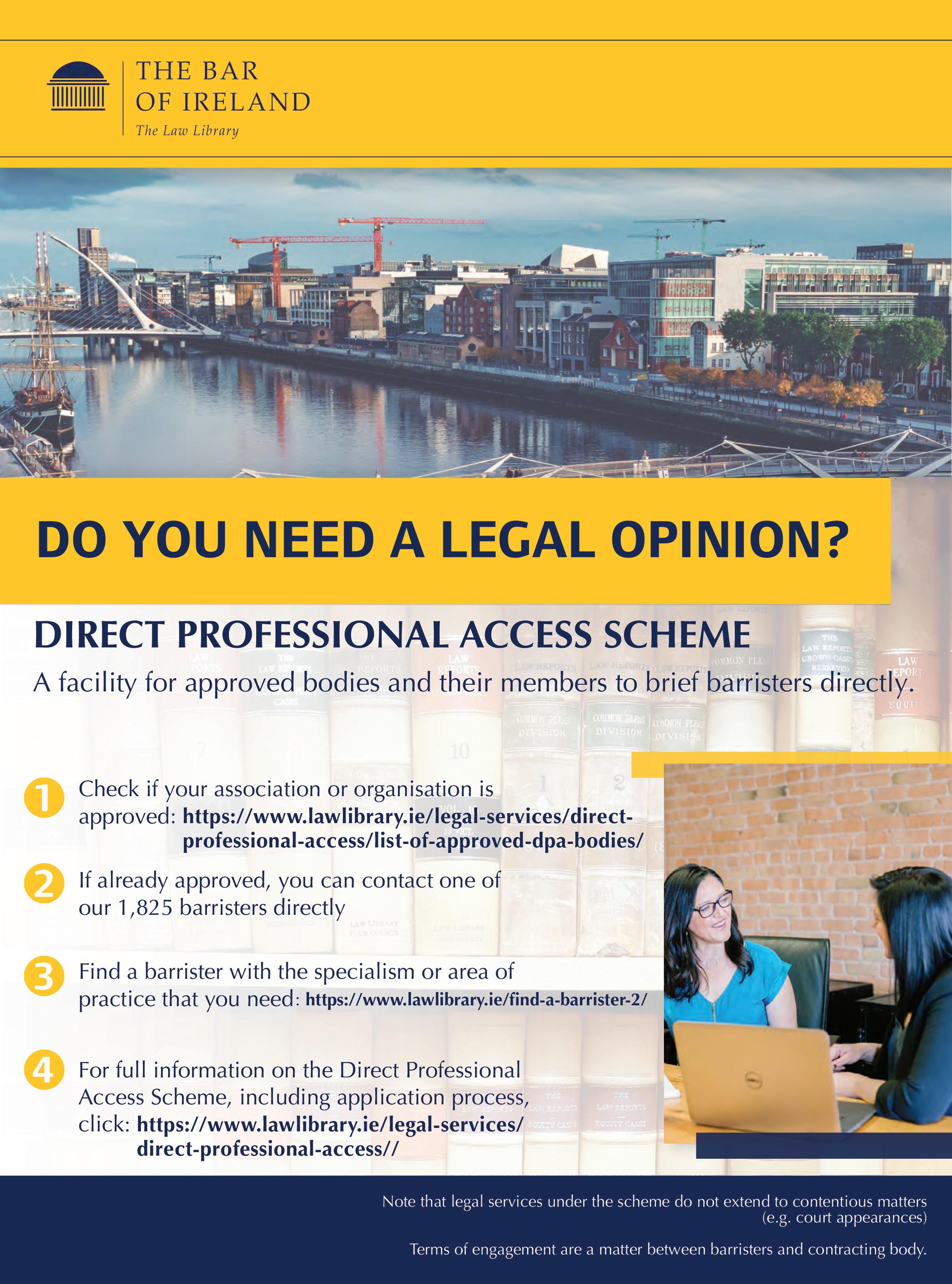














































 Lynn Blake Practice Support Manager
Lynn Blake Practice Support Manager


 Ann-Marie Hardiman Managing Editor, Think Media
Ann-Marie Hardiman Managing Editor, Think Media
















 Charles J. Haughey
Charles J. Haughey


